#but there's DEFINITELY a difference between that art and the ones where the artist outright acts as if evil elain art is genius or sum shit
Text
not even going to lie, I'm glad we are calling out artist too that made elain evil/suspicious for the sake of "it would be interesting/a new facet of her" like they really be thinking their doing some revolutionary shit with that...ma'am...
#elain archeron#pro elain#i love some creepy/cryptic art of her! os whimpsy and fun i even like witchy elain ones#but there's DEFINITELY a difference between that art and the ones where the artist outright acts as if evil elain art is genius or sum shit#one thing is wanting seeing more darker on her powers for fun and another is villianizing her#I'm not gonna put names but an artist came to my mind. they basically saying people assumed the worst of her evil elain art and like GIRL#YOU did that art when the villain elain fever was RAMPANT and you expect people to not think you wheren't agreeing with her antis? lol
10 notes
·
View notes
Text
♡ Dating Bo and Vincent Sinclair Headcanons:
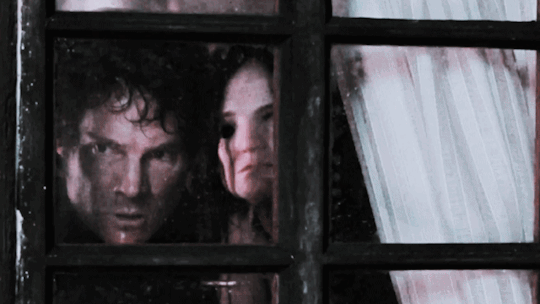
❝ She always said your talent would make up for what God took away from you. ❝
[SFW Headcanons]
Pairings: Artist!Reader x Vincent Sinclair. FemBimbo!Reader x Bo Sinclair.
Warnings: Slight pervert!Bo Sinclair, Mentions of kidnapping+murders, Manipulation.
A/N: Sinclair Twins are some of my new favs. They are so delectably made I can’t- So here are headcanons BUT with describing what their specific types are instead of keeping it vague. Also, I view Vincent as a selective mute who’s vocal chords are a bit fucked up so he only speaks a few times a day so not a complete mute.

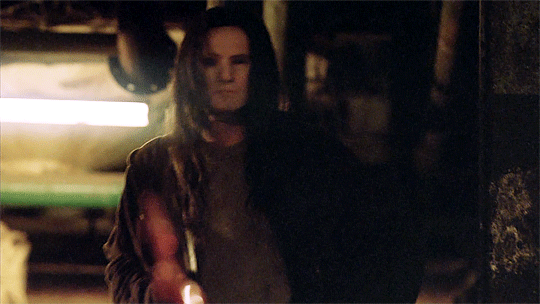
Vincent Headcanons:
✎ Vincent hasn't had any dating experience so much of what he knows is from what Bo has told him which didn't make it interesting in his eyes. But when he sees you, all he wants to do is admire you for whatever reason.
✎ He’d specifically go after you and be the first victim he’d kidnap rather than outright kill.
✎ He tries to convince you he isn’t dangerous (to you) and does little things to prove it. Showing off his drawings, playing music for you, writing notes and letters to you.
✎ Vincent would honestly come off strong because he doesn’t understand how fast or slow a relationship to go. The moment he spotted you, you were already his in his mind.
✎ When you fall for him despite his masked face and silent behaviors, you adjust and get used to him. After all, he wasn’t bad at all. He’d keep you in his room which was tidy and neat as his mother taught him, he’d make sure you were completely taken care of and he was sweet in his little notes.
✎ Vincent’s handwriting is perfect as he was taught to do. His notes would be a little formal but adorable things to find before he slinks away to his studio. “Hello, Y/N. I hope you are adjusting well. :) I wanted to know what foods you like so I can tell Bo to make them. Please write back before lunchtime.”
✎ When he discovers you were an artist as well, he was giddy and excited! Someone who knew what it was like to cycle through ideas and fixate on a project for hours on end.
✎ His few words he’d speak a day would be regarding your own art. No matter what it was, he’d tell Lester to get you the supplies for it and watch over you as you worked.
✎ His ragged and hoarse voice spoken into your ear. “Beautiful…”
✎ He’d randomly gift mini wax sculptures of your favorite animals each week that he worked on between sculptures. Each one better and better than the last.
✎ Vincent thrives on your praise. Sweet boy can’t help but lower his head and blush under his mask at each compliment.
✎ His favorite thing about morning routines were when you’d touch and brush his hair. The massaging at the scalp and tingly feeling he’d get as the brush ran down his black strands felt all too good. He’d also let you do whatever hairstyle you wanted.
✎ Vincent would draw you constantly in his sketchbook. He has pages and pages of different angles of your face, what clothing you wore on a certain day or how you posed during breakfast.
✎ Any and I mean ANY sketches you give him in return? He’s holding onto it like it’s pure gold. He hangs it in his studio where he’s at the most to view it all the time.
✎ Trusts your critiques and observations more than anyone else’s and often asks for your opinion on his pieces.
✎ Doesn’t believe that you like his face without the mask but when he sees you present him with a sketch of his half-mutilated face, he’s stunned. To see him, the truest version of him, as something you deemed worthy to spend time depicting absolutely melts him. He starts to become more willing to remove his mask around you especially if it means he’ll get more drawings like that.
✎ Bo would want so badly to tease Vincent for how he acts around you since Vincent is absolutely infatuated but Bo and Lester find it adorable and are happy Vincent found someone despite everything.
✎ He would definitely want to do those heart hands or hand holding wax molds with you and keep it on his desk.

Bo Headcanons:
> This man’s perfect woman has to be a bimbo, I’m sorry. Someone who is perfectly stupid to overlook some toxic qualities to him and won’t suspect any of his more… violent hobbies.
> Doesn’t have to be the stereotypical busty, all-pink wearing bimbo but just a pretty but airheaded girl.
> He’d originally plan on killing you when you showed up saying your car broke down. You were pretty but so were some other victims who had come through Ambrose. But that dumb factor? Oh, now he’s all in.
> Absolute charmer and reels you in and away from the rest of your group. He’d keep making up reasons as to why you should stay for longer than lie about where your group went.
> He’d keep you sat in the gas station, seeing you so easily entertained. He’d put on that charming smile and tuck your hair behind your ear. “Seems like everyone left you behind, sweetheart. How about you stay jus’ a bit longer, hm? Still need to fix up that car a’ yours, don’t we?”
> He does absolutely use your ditzy and air-headed nature to his advantage to tease because who is he if not a teasing charmer?
> “Aww, sugar, there ain’t much goin’ on in that pretty little head a’ yours, is there?”
> He has purposefully done something to make you trip so he can catch you and make it into a whole romantic scene.
> Absolutely brags to Vincent and Lester about how perfect his girlfriend is.
> He cannot get enough of you at the end of the day. He may have gone into it looking to just use you but consider yourself a charmer as well because he’s soon completely enraptured.
> He enjoys watching you get ready in the morning. Bo will get distracted himself and end up just watch you do your makeup for ten minutes, admiring how pretty you look for him.
> NOTHING BUT PRINCESS TREATMENT!!! He can be toxic and a tease but he likes to be a gentleman too.
> He’s kneeling to put on your shoes on for you, kissing up your leg as he does. He keeps a hand on your back to guide you as you two walk together. Don’t even think about paying for anything because his hand is already in his pocket, ready to pay.
> Bo spoils you rotten. He can’t help it when you smile so sweetly at him that it’s honestly unfair. Sometimes it’s stuff at the store other times it’s stuff he stole from a victim before they met their end. You wouldn’t know, of course, so it’s always a sweet thing.
> If he’s buying you clothes, he’s picking out the tightest options so he can see your body constantly. He’s already turned on constantly by you but he wants to have you all dolled up for him always.
> Although sometimes it can be annoying to have you be so oblivious, he resists any direct insults or rude names since he knows you’ll take it to heart. He never wants to see you upset.
> He knows how much you love his Southern accent and dials it up to 11 with sweet pet names when he needs you for something.
> “Sweetheart, do me a favor an’ pass me the wrench? S’got the blue handle, honey, you know which one.”
> Favorite thing he’s seen you do is when you stole his clothing and became a mini-Bo. Wearing his hat and a jumpsuit all proud of yourself and he couldn’t help but chuckle and claim you should dress like that more often so people know you’re all his.

⤷ divider credits: @cafekitsune
#house of wax#house of wax 2005#slasher fucker#slasher#slashers#slasher x reader#slasher headcanons#slashers x reader#bo sinclair#vincent sinclair#vincent sinclair headcanons#bo sinclair headcanons#ugh they’re simply so babygirl i can’t#bo sinclair x reader#bo sinclair x you#bo sinclair x y/n#vincent sinclair x reader#vincent sinclair x you
1K notes
·
View notes
Text
Okay, just gonna dump all my AI art thoughts under the cut I guess
Just to get it out of the way, we should not be building a world where it isn't possible to become an artist and also eat. If AI art is a threat to that, it's a problem and needs to be hampered in the short term. That takes top priority.
That said, UBI isn't gonna pop up overnight and there are massive roadblocks to that ever happening, we may not see it even in the next few decades. The practical truth is AI art is currently a threat to career art.
But, we should be aiming for a society where most or all work is automated and people don't need a job to survive.
AI art isn't literally collaging other art together, but the ethics are still murky. The fact that it's derivative of other art doesn't inherently make it any different from human-made art, humans also learn to draw by practicing, learning patterns, and imitating other artists.
There's a few issues there- one, the line between art taking inspiration from someone and outright photocopying and collaging stuff together didn't use to be a distinction that anyone paid attention to. It was never a gradient until new technology came along and changed how we define artistic craft, and trying to re-frame our worldview around that is tricky.
Like I said, that line is now a gradient, and at some point along that axis, it makes sense to draw a line and say "this level of similarity is definitely some sort of copyright violation. It's easy to look at some AI-generated art and see why it's scary in its detail and quality, and when it derives that much from other artists, it's hard to say "no, this isn't utilizing someone else's work without their consent or repayment".
I could be wrong, but isn't literally making collages of other people's art perfectly legal and/or socially acceptable? That's another tricky line to walk. You could say there's a difference between making a transformative work of someone else's art and trying to imitate or reproduce it, and there's different ways of interpreting that legally vs. philosophically vs. in terms of people's actual intentions.
AI/Neural Network art is a tool, it works in some fundamentally different ways from human artists, and the distinctions there matter when talking about the ethics. These are serious points against it.
Arguably, a tool that makes its own art shouldn't be held to the same moral standards and afforded the same agency as a sentient being. The AI isn't expressing its own personal creativity, it's making art at the behest of the people using it, according to the design of the people who made it and the art it was trained on. You can feasibly argue that certain things a human is allowed to do, i.e. take inspiration from someone else's art, can't be automatically expected of a machine that doesn't have its own artistic goals and sensibilities and relationship with art and artist. I'm not 100% sure on this, but it's an argument that can be made, I guess, if you're trying to parse these ethics out.
As others have said on the major anti-AI posts, an artificial intelligence can't make the same moral judgement as a human making art, and understand what is or isn't acceptable or overreaching in what it pulls from other people's art.
Tech bros are still douchey, a lot of the people who are advocating for it or will be using AI art for their company are doing so from a selfish or harmful perspective.
AI artists aren't artists. Well, in a way they are (see below), but that doesn't put them anywhere near the same level as actual people who make actual art. There's some level of personal expression, but none of the understanding of what's being expressed and how, which is a humongous part of being an artist.
Companies using AI art to replace paid artists and save money have no interest in the ethics of doing so, and likely won't care if they take improper advantage of someone's art without consent unless laws force them to. Let alone drowning out whatever artistic work exists for artists to make a living.
All the tech bro types who accuse artists of being elitist have no fucking idea what they're talking about, and many seem to want the benefits of art divorced from the real and tangible work and skill that went into making it. Wanting to eat and have one's work properly valued isn't elitist.
AI art is real art. Once you're asking if something is "real art" 90% of the time it is. The threshold for that is so very low.
Some of it is ugly, but calling it "soulless" or whatever is stupid. That's such a subjective take, there's plenty of cool or beautiful AI art I've seen. It's derivative, but again, so is literally all of art.
No seriously, most of the ad hominem stuff I've been seeing comes off as petty and Luddite. Like people realized it was a legitimate threat and immediately went to calling all AI art, or even all neural network based software the devil. It's a tool, it doesn't have an inherent moral value beyond how it's used. Artists have legitimate arguments against this stuff that relates to practical reality and harmful consequences, and going for the nuts instead feels childish and close-minded.
I think AI art is cool, and want to live in a world where it can exist. I don't know what to tell ya.
The ethical issues and tangible harm of this technology take priority over what I want.
But still, a future where machines can just... make art, it's cool. It's cool to envision a world where you can press a button and then more art suddenly exists. Art is cool and more of it existing is good. I would like to see a future where that can happen without hurting anybody.
2 notes
·
View notes
Text
"Writers steal things. It's just a thing."
Definitely recommend this TikTok on fantasy and science fiction writers "stealing" concepts from one another, and specifically Dune. Go watch it, it's quite good and has some great insights.
At times in my life, I really struggled with world building or coming up with story mechanics because I was worried my ideas weren't "original" enough. I was also coming up in the "TV Tropes" and "Cinema Sins" era where being derivative was like the worst thing you could be as a creator. Oh you use well known tropes? People can predict how your book is going to end? You're a bad writer.
Since then it's been proven time and again that predictability is not actually as much of a story killer as we were led to believe. If you think about famously bad TV show finales like Game of Thrones or Lost, a lot of them have one thing in common. The writers' main goal was to surprise the audience. They went with what was least expected, not what was narratively satisfying.
But surprising does not always mean satisfying and in story telling, it often leads to other emotions like disappointment, confusion, frustration, or outright anger. People actually like it sometimes when they can see a particular ending coming or identify a particular trope that they like and can follow to its inevitable conclusion.
This is because people like patterns. We're hardwired to seek them out, even where they don't actually exist. It's how we interpret the chaos of the world around us. Archetypes, tropes, and foreshadowing help ground your audience in the narrative. They serve as signposts to help them find their way and understand the story you are telling them.
I took a very basic music theory class as an elective at university and I remember the professor explaining music as a constant tension between repetition and variety. A composition often consists of variations on a theme. You'll have the same note sequence but played in different key signatures, or the tempo changes, or you may modulate up and down. But ultimately, keeping the audience's interest relies on keeping a balance between repetition and deviation.
The same is true when writing a story. It's actually a good thing to take inspiration from other writers and artists that you admire. You are standing on the shoulders of giants. Centuries of narrative experimentation and tradition have come before you and abandoning all that would be a waste.
Plus, as you explore and take ideas in from other writers you will also start realizing what you don't want to "steal." No work is perfect, and as you experience more of what you like you will also discover what doesn't work. Sometimes it's obvious stuff like racist tropes that are harmful to your audience, misogyny and lack of development for female characters, or even just plot beats that you find boring. (Citation: I love The Amazing Adventures of Kavalier and Clay but I always struggle to get through the part where Joseph is stuck in Antarctica.)
Very often, your early writing will feel like you just made a collage of all the stuff you liked most in your favorite stories. It will feel derivative because you are still processing the structures, tropes, and aesthetics that you like. As you continue to write, and continue to read and explore other modes of art, those edges will start to soften and blend into one another. Like the ingredients of a stew, all your inspiration will get mixed up and brewed together into something that is uniquely your voice.
That's what is really wild about honing your craft. You have to make shitty derivative projects before you can make something truly original and great. Creating a good story usually doesn't happen by just learning what has been done before and doing not that. A good, unique, personal story comes from embracing all the influences on your work that you've stirred around in your brain, stewed for 10+ years and poured back out as something brand new.
Michael Chabon, author of aforementioned favorite book, The Amazing Adventures of Kavalier and Clay once wrote, "All novels are sequels, influence is bliss." So, if you're tackling NaNoWriMo this month or just trying to get something on the page and keep getting stuck on the anxiety of "am I just stealing ideas from better writers?" Don't worry about it. You absolutely are, but so was every other writer you've ever admired. Anyone who says otherwise is a filthy liar.
Embrace your influences. Be mindful and deliberate with them in your work. Through them, you'll find a voice that is genuinely and uniquely you. And above all, keep writing!
0 notes
Text
that one twitter drama over AI art is much ado over, well, not nothing, but it's pretty close to an absence
when we're talking about AI imagery we're talking about outputs on the basis of 1) prompts entered by humans, 2) formulated according to a desired result coming from 2a) certain motivations that 3) leaves the specifics of that result to a complicated equivalent of a vending machine operating according to a large and complicated spreadsheet, 4) and which produces results assembled strictly according to collected precedent
that every generational prompt is ultimately entered by a human entity at a greater or lesser degree of remove and description means is that AI is only an artistic medium, hence the phrase "AI painting" is not analogous to "picasso painting" (a category of authorship) but rather to "oil painting" (a category of media)
that these prompts are formulated according to desired results is both a necessity of the creative process specific to art executed in AI, but also a highly limiting factor: you shake the box and see what falls out, that's how much you control you have over the finer details. this lack of control inherently puts the artist who enters the prompt into a tradeoff where any control over the specific details of the dispensed image is minimal, and from what i'd seen that really is some of the draw of AI art: people want to mash up a fast and dirty prompt on the keyboard to see what comes out
this brings us to the question of 2a) which concerns itself with the motivations behind the usage of AI art. speaking so generally that i'm on the edge of being outright wrong, the way of how a specific medium functions is determined by its physical characteristics, and those physical characteristics are at the same time a set of physical limitations. AI as a medium is characterised by a lack of artistic control over the finer details of an image (which is to say, everything outside of the most central conceit phrased in a prompt is inherently subject to what are effectively aleatoric results) and that is what specifically makes it a quick-and-dirty visualiser for given prompts. this is not a "tradeoff" between characteristics (to speak of a "tradeoff" would be making an assumption of teleology) but a material characteristic of the medium itself. can AI be used as a medium that assists creative work? ideally, yes, and in that sense it's no different from rolling a fistful of dice as a creative aid to shape a musical chord or a time signature or pulling out a deck of Oblique Strategies
what i perceive to be the actual inherent and acute danger in AI as a medium is that it may further exacerbate a dangerous tendency in which we're broadly already eyebrows-deep in and only further sinking into by the day, which is that under the neoliberal commodification of everything, and with consumerism as the operational core of the modern personal identity, for too many people the application of AI will further cement the "consumption of content" over the "enjoyment of art" as the sole paradigm of observing. under audience pressure (that mass audience itself having its perceptions shaped by expansionistic capital) the corporate orthodoxy of the "content creator" will further expel the role of the "artist". this itself has nothing to do with the intrinsics of AI nor the intrinsics of its final products, but it seems ineluctable to me that it will very much shape how people approach art, and whether they approach it as art at all. the idea of AI itself will very definitely be weaponised as a carte blanche to further distort the relationship between art and life, and further graft art as a new head to the hydra of consumption. i hope i'll be wrong, but we will very definitely hear shit like "my computer could paint that" and "this gallery isn't bingeable at all", as if media literacy isn't in a state already bad enough and as if blunt closedness to critical thinking and outside ideas hasn't already butchered mass psychology to the point that our societies have partly disintegrated to the point that fixing the damage may take generations
this is where 3) comes in -- by another analogy, the AI is a claw machine that is both the means by and the place from which the user extracts a toy. once again there's the problem where human autonomy, media literacy, and the awareness of artistic communication are being traded off for extruded product that is available both quickly and conveniently. while art runs the risk of being wank, people producing more generic sensory product to consume for themselves is wank whose wankness is guaranteed. in an atmosphere in which books, for example, are already marketed as purchasable bags of tropes (really just derived from fanfiction), or something even less than that when you mark "gray sweatpants" as a trope, we can not have an automation of such a process, as it will serve both as an economic accelerant as well as a means of legitimation -- not to mention that it licenses capital to see human creative labour as troubling and extraneous. i don't think i have to say the obvious that people's time and money are limited, that shelf-space is limited as well, and that within that context and within the adjoining context of an intellectual atmosphere within audiences which is so gangrenous that it legitimately threatens the economic basis of the arts with a complete expulsion through automated production and behaviouristic control over audiences and their demands -- methods which have already been perfected on social media, as we can see through terms such as "booktok" and "instagrammable books"
this is more related to 4) than to 3) but immediately follows: corporations now have the capacity to significantly shape the intellectual landscape not only through advertising, but also the control of the delivery of information, as well as more subtle behaviouristic methods (see zuboff, the age of surveillance capitalism). i don't think i'm exaggerating when i claim that methods of behaviouristic demand-control are so refined and broadly applied that there is a very real risk that large numbers of people could be so firmly kept in corporate echo-chambers that publishing itself could be coerced into behaving by megacorporations such as amazon or even intermediary advertisers such as facebook, instagram, tiktok, youtube by simply denying publicity to works. to paraphrase that saying, people would be kept as frogs in a well, and, perhaps, even taught to loathe the sea. breaking from precedent could easily be punished, and hence we could easily end up in a nightmarish intellectual coma conducted through extreme skinnerian control. none of this, if it happens, would be the fault of AI, as much as one can not blame the brush for the painter's depictions, but i do think that we're facing an acute danger from the application of this technology which could very easily, coupled with means of social control through social media, result in the further substitution of the arts and education with content and factoids, and that the tipping-point after which we plunge into a society of critical-mass adverthink is much, much closer than we tend to think
(and before you ask, yes, i do in fact believe from what i know that the tech and advertising sectors are openly flexing totalitarian methods of control which are very much in line with what hannah arendt described in the origins of totalitarianism, but that's a whole other post)
0 notes
Note
Hi :) If it's not too much trouble, could you please share your take on why they'd continue the Adventure brand after tri. was such a flop? (and a tangent: what does "dark history" even mean?). We got Kizuna, the reboot, and a 02 movie. Logically, it doesn't really make sense they'd keep investing in it.
This is a thorny topic, and I'd like to reiterate that although I've ended up making more posts related to this series and the discourse surrounding it recently (probably because it's even more on the mind now that another movie is on the horizon and a lot of people are apprehensive for various reasons), I do not want this blog to be making a brand out of being critical of this series. I’m writing this here and in public because I figured that there is a certain degree I need to clarify what I mean about audience reception/climate and how it might impact current or future works, and I’m admittedly also more than a little upset that I occasionally see Western fanbase criticisms of the series getting dismissed by people claiming that the only people mad about it are dramamongering or ignorant Westerners (which could not be further from the truth). However, this is mainly to address this and to answer your question, and is not intended to try and change anyone's existing opinion or impression of the series as much as it's me trying to explain (from my own personal reading of the situation) what practically went down with critical reception in real life; no more, no less.
The short summary of the matter is:
The series was a moderate financial success (albeit with some caveats; see the long version for details) and definitely outstripped a lot of prior attempts to revive the franchise;
However, the overall Japanese fanbase-side critical backlash from tri. was extremely and viciously negative to the point where even acknowledging the series too much could easily result in controversy;
Kizuna’s production and the PR surrounding it very obviously have this in mind with a lot of apparent “damage control” elements.
The long version is below.
Note that while I try to be diligent about citing my sources so people understand that I’m not just making things up wholesale, I’m deliberately refraining from linking certain things here this time, both because some of the things mentioned have some pretty crude things written there -- it’s not something I feel comfortable directing people to regardless of what language it’s in -- and because I don’t want to recklessly link things on social media and cause anyone to go after or harass the people involved. For the links that have been provided, please still be warned that some of them don’t really link to particularly pleasant things.
I am not writing the following information to suggest that anyone should agree or disagree with the sentiments being described. I know people tend to take "a lot of people like/hate this" as a signal of implication "it is correct to like/hate this" when it's not (and I especially dislike the idea of implying that Japanese fanbase opinions are the only correct ones). There's a reason I focus on "critical reception being this way" (because it influences marketing decisions and future direction) rather than how much this should impact one's personal feelings; this is coming from myself as someone who is shamelessly proud of liking many things that had bad critical reception, were financial failures, or are disliked by many. As I point out near the end, the situation also does seem to be changing for the better in more recent years as well.
Also, to be clear, I'm a single person who's observing everything best I can from my end, I have no affiliations with staff nor do I claim to, and as much as I'm capable of reading Japanese and thus reading a lot of people's impressions, I'm ultimately still another “outsider” looking in. These are my impressions from my observation of fan communal spaces, following artists and reading comments on social media and art posting websites, and results from social media searches. In the end, I know as much as anyone else about what happened, so this is just my two cents based on all of my personal observations.
A fanbase is a fanbase regardless of what part of the world you're from. There are people who love it and are shameless about saying so. There are people who have mixed feelings or at least aren't on extreme ends of the spectrum (as always, the loudest ones are always the most visible, but it's not always easy to claim they're the predominant percentage of the fanbase). That happens everywhere, and I still find that on every end I've seen. However, if I'm talking about my impressions and everything I’ve encountered, I will say that the overall Japanese reaction to tri. comes off as significantly more violently negative on average than the Western one, which is unusual because often it's the other way around. (I personally feel less so because the opinions are that fundamentally different and more so because we're honestly kind of loud and in-your-face people; otherwise, humans are mostly the same everywhere, and more often than not people feel roughly the same about everything if they’re given the same information to work with.)
This is not something I can say lightly, and thus would not say if I didn’t really get this impression, but...we're talking "casually looking up movie reviews for Kizuna have an overwhelming amount of people casually citing any acknowledgment of tri. elements as a negative element", or the fact that even communal wikis for "general" fandoms like Pixiv and Aniwota don't tend to hold back in being vicious about it (as of this writing, Pixiv's wiki refuses to consider it in the same timeline as Adventure, accusing it of being "a series that claims to be a sequel set three years after 02 but is in fact something different"). Again, there are people who openly enjoy it and actively advocate for it (and Pixiv even warns people to not lord over others about it condescendingly because of the fact that such people do exist), and this is also more of a reflection of “the hardcore fanbase on the Internet” and not necessarily the mainstream (after all, there are quite a few other Digimon works where the critical reception varies very heavily between the two). Nevertheless, the take-home is that the reputation is overall negative among the Internet fanbase to the point that this is the kind of sentiment you run into without trying all that hard.
I think, generally speaking, if we're just talking about why a lot of people resent the series, the reasons aren't that different from those on the Western side. However, that issue of "dark history" (黒歴史): there's a certain degree of demand from the more violently negative side of the fanbase that's, in a sense, asking official to treat it as a disgrace and never acknowledge it ever again, hence why Kizuna doing so much as borrowing things from it rather than rejecting it outright is still sometimes treated like it’s committing a sin. So it's somewhat close in spirit to a retcon movement, which is unusual because no other Digimon series gets this (not even 02; that was definitely a thing on the Western end, but while I'm sure there are people who hate it that much on their end too, I've never really seen it gain enough momentum for anyone to take it seriously). If anyone ever tells you that Japanese fanbases are nice to everything, either they don't know Japanese, are being willfully ignorant, or are lying to you, because there is such thing as drama in those areas, and in my experience, I've seen things get really nasty when things are sufficiently pushed over the edge, and if a fanbase wants to have drama, it will have drama. This happens to be one of those times.
(If you think this is extreme, please know that I also think so too, so I hope you really understand that me describing this sentiment does not mean I am personally endorsing it. Also, let me reiterate that the loudest section of the fanbase is not necessarily the predominant one; after all, as someone who’s been watching reactions to 02 over the years, I myself can attest that its hatedom has historically made it sound more despised than it actually is in practice.)
My impression is that the primary core sentiment behind why the series so much as existing and being validated is considered such an offense (rather than, say, just saying "wow, that writing was bad" and moving on) is heavily tied to the release circumstances the series came out in during 2015-2018, and the idea that "this series disrespected Adventure, and also disrespected the fanbase.” (I mean, really, regardless of what part of the world you’re from, sequels and adaptations tend to be held to a higher bar of expectation than standalone works, because they’re expected to do them justice.) A list of complaints I’ve come across a lot while reading through the above:
The Japanese fanbase is pretty good at recordkeeping when it comes to Adventure universe lore, partially because they got a lot of extra materials that weren’t localized, but also partially because adherence to it seems to generally be more Serious Business to them than it is elsewhere. For instance, “according to Adventure episode 45, ‘the one who wishes for stability’ (Homeostasis) only started choosing children in 1995, and therefore there can be no Chosen Children before 1995” is taken with such gravity that this, not anything to do with evolutions or timeline issues, is the main reason Hurricane Touchdown’s canonicity was disputed in that arena (because Wallace implies that he met his partners before 1995). It’s a huge reason the question of Kizuna also potentially not complying to lore came to the forefront, because tri. so flagrantly contradicts it so much that this issue became very high on the evaluation checklist. In practice, Kizuna actually goes against Adventure/02 very little, so the reason tri. in particular comes under fire for this is that it does it so blatantly there were theories as early as Part 1 that this series must take place in a parallel universe or something, and as soon as it became clear it didn’t, the resulting sentiment was “wow, you seriously thought nobody would notice?” (thus “disrespecting the audience”).
A lot of the characterization incongruity is extremely obvious when you’re following only the Japanese version, partially because it didn’t have certain localization-induced characterization changes (you are significantly less likely to notice a disparity with Mimi if you’re working off the American English dub where they actually did make her likely to step on others’ toes and be condescending, whereas in Japanese the disparity is jarring and hard to miss) and partially due to some things lost in translation (Mimi improperly using rough language on elders is much easier to spot as incongruity if you’re familiar with the language). Because it’s so difficult to miss, and honestly feels like a lot of strange writing decisions you’d make only if you really had no concept of what on earth happened in the original series, it only contributes to the idea that they were handling Adventure carelessly and disrespectfully without paying attention to what the series was even about (that, or worse, they didn’t care).
02 is generally well-liked there! It’s controversial no matter where you go, but as I said earlier, there was no way a retcon movement would have ever been taken seriously, and the predominant sentiment is that, even if you’re not a huge fan of it, its place in canon (even the epilogue) should be respected. So not only flagrantly going against 02-introduced lore but also doing that to a certain quartet is seen as malicious, and you don’t have as much of the converse discourse celebrating murdering the 02 quartet (yeah, that’s a thing that happened here) or accusing people with complaints of “just being salty because they like 02″ as nearly as much of a factor; I did see it happen, or at least dismissals akin to “well it’s Adventure targeted anyway,” but they were much less frequent. The issue with the 02 quartet is usually the first major one brought up, and there’s a lot of complaints even among those who don’t care for 02 as much that the way they went about it was inhumane and hypocritical, especially when killing Imperialdramon is fine but killing Meicoomon is a sin. Also, again, “you seriously think nobody will see a problem with how this doesn’t make sense?”
I think even those who are fans of the series generally agree with this, but part of the reason the actual real-life time this series went on is an important factor is that the PR campaign for this series was godawful. Nine months of clicking on an egg on a website pretending like audience participation meant something when in actuality it was blatantly obvious it was just a smokescreen to reveal info whenever they were ready? This resulted in a chain effect where even more innocuous/defensible things were viewed in a suspicious or negative light (for instance, "the scam of selling the fake Kaiser's goggles knowing Ken fans would buy it only to reveal that it's not him anyway"), and a bunch of progressively out-of-touch-with-the-fanbase statements and poor choices led to more sentiment “yeah, you’re just insulting the fanbase at this point,” and a general erosion of trust in official overall.
On top of that, the choice of release format to have it spread out as six movies over three years seems to have exacerbated the backlash to get much worse than it would have been otherwise, especially since one of the major grievances with the series is that how it basically strung people along, building up more and more unanswered questions before it became apparent it was never going to answer them anyway. So when you’re getting that frustrated feeling over three whole years, it feels like three years of prolonged torture, and it becomes much harder to forgive for the fallout than if you’d just marathoned the entire thing at once.
For those who are really into the Digimon (i.e. species) lore and null canon, while I’m not particularly well-versed in that side of the fanbase, it seems tri. fell afoul of them too for having inaccurately portrayed (at one point, mislabeled) special attacks and poorly done battle choreography, along with the treatment of Digimon in general (infantilized Digimon characterization, general lack of Digimon characters in general, very flippant treatment of the Digital World in Parts 3-5). If you say you’re going to “reboot” the Digital World and not address the entire can of worms that comes with basically damaging an entire civilization of Digimon, as you can imagine, a lot of people who actually really care about that are going to be pissed, and the emerging sentiment is “you’re billing this as a Digimon work, but you don’t even care about the monsters that make up this franchise.”
The director does not have a very positive reputation among those who know his work (beyond just Digimon), and in general there was a lot of suspicion around the fact they decided to get a guy whose career has primarily been built on harem and fanservice anime to direct a sequel to a children’s series. Add to that a ton of increasingly unnerving statements about how he intended to make the series “mature” in comparison to its predecessor (basically, an implication that Adventure and 02 were happy happy joy series where nothing bad ever happened) and descriptions of Adventure that implied a very, very poor grasp of anything that happened in it: inaccurate descriptions of their characters, poor awareness of 02′s place in the narrative, outright saying in Febri that he saw the Digimon as like perpetual kindergartners even after evolving, and generally such a flippant attitude that it drove home the idea that the director of an Adventure sequel had no respect for Adventure, made this series just to maliciously dunk on it for supposedly being immature, and has such a poor grasp of what it even was that it’s possible he may not have seen it in the first place (or if he did, clearly skimmed it to the extent he understood it poorly to pretty disturbing levels). As of this writing, Aniwota Wiki directly cites him as a major reason for the backlash.
In general, consensus seems to be that the most positively received aspect of the series (story-wise) was Part 3 (mostly its ending, but some are more amenable to the Takeru and Patamon drama), and the worst vitriol goes towards Parts 2 (for the blatantly contradictory portrayal of Mimi and Jou and the hypocritical killing of Imperialdramon) and 4 (basically the “point of no return” where even more optimistic people started getting really turned off). This is also what I suspect is behind the numbers on the infamous DigiPoll (although the percentage difference is admittedly low enough to fall within margin of error). However, there was suspicion about the series even from Part 1, with one prominent fanartist openly stating that it felt more like meeting a ton of new people than it did reuniting with anyone they knew.
So with all of that on the table: how did this affect official? The thing is that when I say “violently negative”, I mean that also entailed spamming official with said violently negative social media comments. While this is speculation, I am fairly certain that official must have realized how bad this was getting as early as between Parts 4 and 5, because that’s where a lot of really suspicious things started happening behind the scenes; while I imagine the anime series itself was now too far in to really do anything about it, one of the most visible producers suddenly vanished from the producer lineup and was replaced by Kinoshita Yousuke, who ended up being the only member of tri. staff shared with Kizuna (and, in general, the fact that not a single member of staff otherwise was retained kind of says a lot). Once the series ended in 2018 and the franchise slowly moved into Kizuna-related things, you might notice that tri.-branded merch production almost entirely screeched to a halt and official has been very touchy about acknowledging it too deeply; it’s not that they don’t, but it’s kind of an awfully low amount for what you’d think would be warranted for a series that’s supposed to be a full entry in the big-name Adventure brand.
The reason is, simply, that if they do acknowledge it too much, people will get pissed at them. That’s presumably why the tri. stage play (made during that interim period between Parts 4 and 5 and even branded with the title itself) and Kizuna are really hesitant to be too aggressive about tri. references; it’s not necessarily that official wants to blot it out of history like the most extreme opinions would like them to, but even being too enthusiastic about affirming it will also get them backlash, especially if the things they affirm are contradictory to Adventure or 02. And considering even the small references they did put in still got them criticism for “affirming” tri. too much, you can easily see that the backlash would have been much harder if they’d attempted more than that; staying as close as possible to Adventure and 02 and trying to deal with tri. elements only when they’re comparatively inoffensive was pretty much the “safe” thing to do in this scenario (especially since fully denying tri. would most certainly upset the people who did like the series, and if you have to ask me, I personally think this would have been a pretty crude thing to have done right after the series had just finished). Even interviews taken after the fact often involve quickly disclaiming involvement with the series, or, if they have to bring up something about it, discussing the less controversial aspects like the art (while the character designs were still controversial, it’s at least at the point where some fanartists will still be willing to make use of them even if they dislike the series, albeit often with prominent disclaimers) or the more well-received parts of Part 3; Kizuna was very conspicuously marketed as a standalone movie, even if it shared the point of “the Adventure kids, but older” that tri. had.
(Incidentally, the tri. stage play has generally been met with a good reputation and was received well even among people who were upset with the anime, so it was well-understood that they had no relation. In fact, said stage play is probably even better received than Kizuna, although that’s not too surprising given the controversial territory Kizuna goes into, making the stage play feel very play-it-safe in comparison.)
So, if we’re going to talk about Kizuna in particular: tri. was, to some degree, a moderate financial success, in the sense that it made quite a bit of money and did a lot to raise awareness of the Digimon brand still continuing...however, if you actually look at the sales figures for tri., they go down every movie; part of it was probably because of the progressively higher “hurdle” to get into a series midway, but consider that Gundam Unicorn (a movie series which tri.’s format was often compared to) had its sales go up per movie thanks to word of mouth and hype. So while tri. does seem to have gotten enough money to help sustain the franchise at first, the trade-off was an extremely livid fanbase that had shattered faith in the brand and in official, and so while continuing the Adventure brand might still be profitable, there was no way they were going to get away with continuing to do this lest everything eventually crash and burn.
Hence, if you look at the way Kizuna was produced and advertised, you can see a lot of it is blatantly geared at addressing a lot of the woes aimed at tri.: instead of the staff that had virtually no affiliation with Toei, the main members of staff announced were either from the original series (Seki and Yamatoya) or openly childhood fans, the 02 quartet was made into a huge advertising point as a dramatic DigiFes reveal (and character profies that tie into the 02 epilogue careers prominently part of the advertising from day one), and they even seemed to acknowledge the burnout on the original Adventure group by advertising it so heavily as “the last adventure of Taichi and his friends”, so you can see that there’s a huge sentiment of “damage control” with it. How successful that was...is debatable, since opinions have been all over the board; quite a few people were naturally so livid at what happened with tri. that Kizuna was just opening more of the wound, but there were also people who liked it much better and were willing to acknowledge it (with varying levels of enthusiasm, some simply saying “it was thankfully okay,” and some outright loving it), and there was a general sentiment even among those who disliked both that they at least understood what Kizuna was going for and that it didn’t feel as inherently disrespectful. (Of course, there are people who loved tri. and hated Kizuna, and there are people who loved both, too.)
Moreover, Kizuna actually has a slightly different target audience from tri.; there’s a pretty big difference between an OVA and a theatrical movie, and, quite simply, Kizuna was made under the assumption that a lot of people watching it may not have even seen tri. in the first place. An average of 11% of the country watched Adventure and 02, but the number of people who watched tri. is much smaller, in part due to the fact that its “theater” screenings were only very limited screenings compared to Kizuna being shown in theaters in Japan and worldwide, and in part due to the fact that watching six parts over three years is a pretty huge commitment for someone who may barely remember Digimon as anything beyond a show they watched as a kid, and may be liable to just fall off partway through because they simply just forgot. (Which also probably wasn’t helped by the infamously negative reputation, something that definitely wouldn’t encourage someone already on the fence.) And that’s yet another reason Kizuna couldn’t make too many concrete tri. references; being a theatrical movie, it needs to have as wide appeal as possible, and couldn’t risk locking out an audience that had a very high likelihood of not having seen it, much less to the end -- it may have somewhat been informed by tri.’s moderate financial success and precedent, but it ultimately was made for the original Adventure and 02 audience more than anything else.
I would say that, generally, while Kizuna is “controversial” for sure, reception towards the movie seems to be more positive than negative, it won over a large chunk of people who were burned out by tri., and it clearly seems to have been received well enough that it’s still being cashed in on a year after its release. The sheer existence of the upcoming 02-based movie is also probably a sign of Kizuna’s financial and critical success; Kinoshita confirmed at DigiFes 2020 that nothing was in production at the time, and stated shortly after the movie’s announcement that work on it had just started. So the decision to make it seems to have been made after eyeing Kizuna’s reception, and, moreover, the movie was initially advertised from the get-go with Kizuna’s director and writer (Taguchi and Yamatoya), meaning those two have curried enough goodwill from the fanbase that this can be used to promote the movie. (If not, you would think that having and advertising Seki would be the bigger priority.) While this is my own sentiment, I am personally doubtful official would have even considered 02 something remotely profitable enough on its own to cash in on if it weren’t for this entire sequence of events of 02′s snubbing in tri. revealing how much of a fanbase it had (especially with the sheer degree of “suspicious overcompensation” Kizuna had with its copious use of the 02 quartet and it tagging a remix of the first 02 ED on the Hanareteitemo single, followed by the drama CD and character songs), followed by Kizuna having success in advertising with them so heavily. Given all of the events between 2015 and now, it’s a bit ironic to see that 02 has now become basically the last resort to be able to continue anything in the original Adventure universe without getting too many people upset at them about it.
The bright side coming out of all of this is that, while it’s still a bit early to tell, now that we’re three years out from tri. finishing up and with Kizuna in the game, it seems there’s a possibility for things improving around tri.’s reception as well. Since a lot of the worst heated points of backlash against it have a very “you had to have been there” element (related to the PR, release schedule, and staff comments), those coming in “late” don’t have as much reason to be as pissed at it; I’ve seen at least one case of a fanartist getting back into the franchise because of Kizuna hype, watching tri. to catch up, casually criticizing it on Twitter, and moving on with their life, presumably because marathoning the whole thing being generally aware of what’ll happen in it and knowing Kizuna is coming after anyway gives you a lot less reason to be angry to the point of holding an outright grudge. Basically, even if you don’t like it, it’s much easier to actually go “yeah, didn’t like that,” not worry too much about it, and move on. Likewise, I personally get the impression that official has been starting to get a little more confident about digging up elements related to it. Unfortunately, a fairly recent tweet promoting the series getting put on streaming services still got quite a few angry comments implying that they should be deleting the scourge from the Internet instead, so there’s still a long way to go, but hopefully the following years will see things improve further...
In regards to the reboot, I -- and I think a lot of people will agree with me -- have a bit of a hard time reading what exact audience it’s trying to appeal to; we have a few hints from official that they want parents to watch it with their children, and that it may have been a necessary ploy in order to secure their original timeslot. So basically, the Adventure branding gets parents who grew up with the original series to be interested in it and to show it to their kids, and convinces Fuji TV that it might be profitable. But as most people have figured by now, the series has a completely different philosophy and writing style -- I mean, the interview itself functionally admits it’s here to be more action-oriented and to have its own identity -- and the target audience is more the kids than anything else. As for the Internet fanbase of veterans, most people have been critical of its character writing and pacing, but other than a few stragglers who are still really pissed, it hasn’t attracted all that much vitriol, probably because in the end it’s an alternate universe, it doesn’t have any obligation to adhere to anything from the original even if it uses the branding, and it’s clearly still doing its job of being a kids’ show for kids who never saw the original series nor 02, so an attempt to call it “disrespectful” to the original doesn’t have much to stand on. A good number of people who are bored of it decided it wasn’t interesting to them and dropped it without incident, while other people are generally just enjoying it for being fun, and the huge amount of Digimon franchise fanservice with underrepresented Digimon and high fidelity to null canon lore is really pleasing the side of the fanbase that’s into that (I mean, Digimon World Golemon is really deep in), so at the very least, there’s not a lot to be super-upset about.
53 notes
·
View notes
Text
Ok like I'm sorry for all the Elias discourse but stepping off from OGlias for a moment I legit saw someone saying it was a mischaracterisation to assume Jonah Magnus was himself a rich white dude which
uh
Let's leave aside for the moment that Jonah Magnus not being wealthy and privileged utterly sucks the meaning of of a lot of what the podcast has to say about class and exploration because hey, that's a matter of interpretation
What do we know about Jonah Magnus (from all statements mentioning his original incarnation)?
1816: Interacts as at least an equal with Albrecht von Closen, who has at least one family estate and an aristocratic pedigree and thus could be expected to be at least middle class if not wealthy. This is relevant because Georgian class was very stratified and cross-class mixing heavily discouraged, 1816 is probably fairly early in Magnus' career, and Albrecht doesn't address him as one would a social inferior.
1818: Established the Magnus Institute, apparently without external funding partners because he's the only one ever mentioned in connection with its organisation and his friends talk about it as his own project; it certainly isn't associated with an existing university or academy as far as we can tell.
1824: not a lot of additional information, except that again Magnus' friends are all moving in wealthy, upper class circles
1831: In a position to hire professionals for Millbank under good terms. We learn more about Albrecht, he's definitely painted as wealthy old money, which continues to speak to this association
1841: reasonably close friends with Sampson Kempthorne, workhouse designer, who expresses the expectation of Magnus agreeing with him about workhouses and the treatment of the poor through work. At this time, Magnus is living in an Edinburgh townhouse, by which I'm guessing we're talking about one of the New Town Georgian 4-floors-plus-servant's-quarters which that name implies. Those aren't mansions, but they weren't where a clerk or shopkeeper would live - they were built for ship owners, lawyers, doctors, the upper-middle and upper classes, and as the name townhouse implies they were generally occupied as one of several estates, with the usual occupants being likely to also have a country place.
Beyond specific statement letters, Magnus largely crops up via his association with his wee gang, all of whom are wealthy upper-middle or aristocracy (Smirke, Rayner, Lukas)
He has the resources and social clout to devote his time to pursuing what is, effectively, a hobby; his interest in the supernatural doesn't bring in much income and, conversely, often costs him to chase up. He doesn't appear to have a full-time job at any point; he works on Millbank with Smirke but he doesn't appear on the records, meaning this is unlikely to be a paid management role. His friends refer to his supernatural work as a hobby or interest, not a job, and make it clear that at least by the 1830s-40s this is his whole life (he's "rattling around with his books and letters") - ergo he does not have a need to support himself beyond that.
He had the resources and funds to, by himself and for his own purposes, not only shape the building of Millbank but also to set up an independent academic institution which is still running 200 years later
Like, is it explicit that he's a rich white man? Not per se. Would all of this information make sense if he wasn't? I suppose it's possible but it's a reach, and one that I'm not sure why you as a writer would make without making pretty clear. To be able to move comfortably in moneyed Georgian circles without being born to money, and to be able to do the things Magnus does without having substantial disposable income - that would be exceptional, and would surely merit some sort of comment.
(I've talked about the race politics of Georgian Britain as relates to Jonah Magnus before, but just to sum up: in a time before the abolition of the slave trade and during massive colonial expansion into Asia, being a British man of wealth and not being white was pretty unusual. We can see this in the description of Rayner; he's very specifically described as Black, but also his Blackness is notable to a contemporary narrator. so again, not impossible for Jonah to be a person of colour, but definitely unexpected and it would be an interesting choice to write that unremarked)
just by way of historical context, as I say, class was very structured and immobile in Georgian Britain for the most part. It was also, as I understand it, much more discrete. Whereas now, the lines between working class, middle class and upper class are pretty fuzzy, in the 1800s they were a lot more clear-cut - the working class worked for little money, had little to no education past basic literacy and numeracy, and the entire household would work; the newly developing middle class made a living through highly-skilled jobs (artists, doctors, lawyers, clerks, shopkeepers, factory owners, shop owners and pub landlords, for example) and would have enough disposable income to buy property; and the upper class/gentry may work (but only appropriate to their station; academia, law or the church, largely, and of course a lot of them in the 1810s made bank from Caribbean plantations and their imports) but substantially they lived off the profits of investments, ownership and estate management, built off heritable wealth.
There’s a big range of middle class though, although it was a small segment of society. At the bottom end, you have your grocers, pub landlords, shopkeepers, clerks and so on - they probably own their homes and business and have money to buy things outright rather than renting. At the top end, we have some really pretty substantial wealth - we’re talking multiple houses and estates, large-scale business concerns, tens of permanent staff, and only one person in the family needing to work. The difference between upper middle and aristocracy isn’t necessarily in quality of life, aside from blood it’s really just a question of whether the majority of your income comes from work or from investment and property management. So for example, Smirke is upper middle, but very wealthy - he has a career in a high-profile trade, he’s notable and welcome in high society, but ultimately his wealth is dependent on him continuing to get work. Von Closen may have more or less material wealth than Smirke, but his money is old money and he does not work; he’s very much a gentleman of the upper crust. Particularly with Industrial Revolution and the profit that the slave trade and the expansion of the Empire were bringing in for traders, the middle class was abruptly getting a lot richer in at the start of the 19th century and if anything class was getting a lot more discrete - urbanisation and industrialisation meant the poor were getting poorer (and less able to exist outside a monetary economy) and the working rich were getting a lot richer (until of course after a couple of hundred years the upper middle class almost eclipsed the idle class as the Rich and Powerful)
So the gentry/nobles/old money/upper class were the only class whose wealth wasn’t to a high degree reliant on them working, and so honestly being a Georgian gentleman was stultifyingly boring. That’s why so many comedies of manners crop up from the lower end of the upper class - you have to find something to keep you busy and social politicking is something. But it also meant a lot of gentlemen scholars - men with time on their hands and nothing they desperately needed to be doing, who got really into eccentric hobbies and niche interests (like social engineering, or art theory, or the occult, or unpicking weirdly specific theological concepts, or a bit earlier experimenting with light and lenses, or a bit later investigating the origins of species, or getting super into a specific aspect of the classics). The idle rich weren’t the only ones doing academia or research, but they had the time, money and resources to devote to really deep dives into things without much financial use.
So my personal take is that, given that by 1818 Jonah Magnus had the capital, the social heft and the time to found and run an independent academic institution focused on his relatively niche interests, and to do so with enough resourcing that it still runs 200 years later, the safest bet is that he was born a gentleman. At the very least, all the people he socialises with are securely upper-middle or gentry; he has a visible disdain for the poor; he owned substantial personal property by at least middle age (the Edinburgh townhouse); he had the social clout to get involved behind the scenes in a major social architecture project - it seems like the lowest this could possibly place him is mid-to-upper middle class at birth (he could have made that much money from working and lucky investments, but to get into a position where by middle age you can afford to become the Idle Rich, spending all your money and time on an obsessive personal interest, you would need to have started off with at least the capital and clout to get a high-level education and/or make significant business investments (say, buy a series of factories or build a shipping empire). You could make a case that he could work his way up from being born to a middling-middle-class family - maybe a country vicar or a shopkeeper - but friends can I show you some numbers I googled?
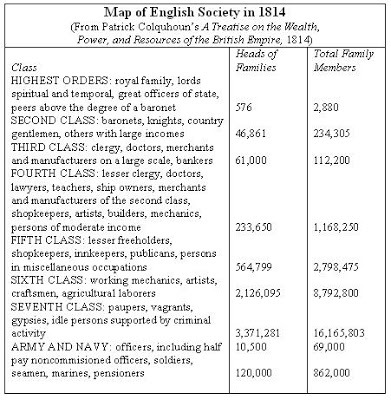
In the 1810s, being mid- or upper middle class (fourth or above) meant you were richer than 94.5% of the civilian population. Upper middle and above (like literally every person we know of who had social ties to Magnus except maybe the architects)? Literally top 1%. (well. 1.25%).
The middle class in Georgian Britain was the elite. They weren’t the elite of the elite, but they had money, land, property, staff, clout and privilege. You can’t project the class politics of 2021 onto 1818 (that is, in fact, why pure Marxism still requires an updated reading, bc in even the last 150 years the specific distribution and attributes of class and wealth has changed substantially (although the same people do stay at the top and bottom)).
I think our perceptions are altered by the worries and perspectives of popular contemporary authors. For example, Austen characters often bemoan their lack of wealth, and are firmly Middle Class, and compared to the upper middle and the gentry they are living frugally and on a budget, but with “cottages” that are often six- or seven bedroom houses with several parlours and one or two servants, plus a town house, and with only one breadwinner per family and enough invested wealth to live entirely off the interest (that’s what the incomes of these characters are), they are living in a degree of wealth that would be unthinkable to 95% of their contemporaries, and it would be fair to assess them as rich by modern standards.
You can argue that Jonah Magnus wasn’t aristocracy. You cannot argue realistically that he wasn’t rich. Not only does that make no thematic or character sense (again, that’s a matter of interpretation, but it seems to me to be Pretty Key to his character that he’s an examination of inborn privilege) but it also makes no contextual historical sense.
#pls pay attention to me i spent way too long on this#p r o c r a s t i n a t i n g#also. there is an argument that class mobility was increasing#but uhhhh that doesn't mean it was a plausible thing to jump from penury to princedom#example: in the 1810s my ancestor walked from Edinburgh to London to seek his fortune and escape starvation at home#his was a remarkable rags to riches story#but his 'riches' was a job as a low-level law clerk and an undergraduate degree from Cambridge#he owned a flat I think#but he wasn't out here with the personal wealth to set up an independent research foundation#(I don't remember which ancestor but I think great grandfather?)#anyway the point is this is a wild take#I could talk at length about how it ALSO makes no thematic sense but I feel like I've tapped that one enough lately#tma meta
183 notes
·
View notes
Note
hello!! i saw that you made a lot of stuff for 1872 and i was wondering if 1872 tony is similar to regular comics tony?? i know mcu and comics tony are different and i want to get into 616, but if 1872 comics are more easy to read i might try those first! 😅
Hello, hello!
Thank you for asking, and sorry it took me so long to get back to you! I wanted to think about it and put together a thoughtful response because I am desperately trying to convert MCU fans to 1872. Or comics fans who just haven’t gotten into 1872.
This post will contain some 1872 spoilers, but not the Big Spoiler that you probably already know about anyways.
Anyways, let’s get into it. Yeehaw.
What is 1872? It’s Steve/Tony in the wild west.
1872 comics are very easy to read, very short, and you need absolutely no prior knowledge to get into them; I highly recommend these as a start point for MCU fans who are curious about dipping their toes into some of the other Steve/Tony universes. And 1872 is, indeed, a Steve/Tony universe. It’s really gay, (and dramatic.) Uh. So gay, in fact, that one of the comic artists who drew pages even occasionally shares Steve/Tony shipping memes. So.
Marvel 1872 is a four issue series released as a part of the Secret Wars event; you really do not need to know anything about this to enjoy 1872, because it is a self-contained alternate universe in a “pocket dimension”, meaning it’s totally separate from the 616 cannon but technically exists in the expanse of the multiverse!
Here’s the summary:
In the Battleworld zone of 1872, Sheriff Steve Rogers faces corruption and fear in the boom town of Timely. Can Anthony Stark pull Rogers' fat from the fire? Probably not, since the only thing he seems capable of pulling is a cork from a bottle. Things in Timely are bad, and getting worse — and when a stranger arrives in town, Timely will be changed forever.
Now, to compare “regular comics Tony”, or 616 Tony, with 1872 Tony.
The main difference? 616 Tony wears this sexy little under suit (or nothing) under his armor, like this:
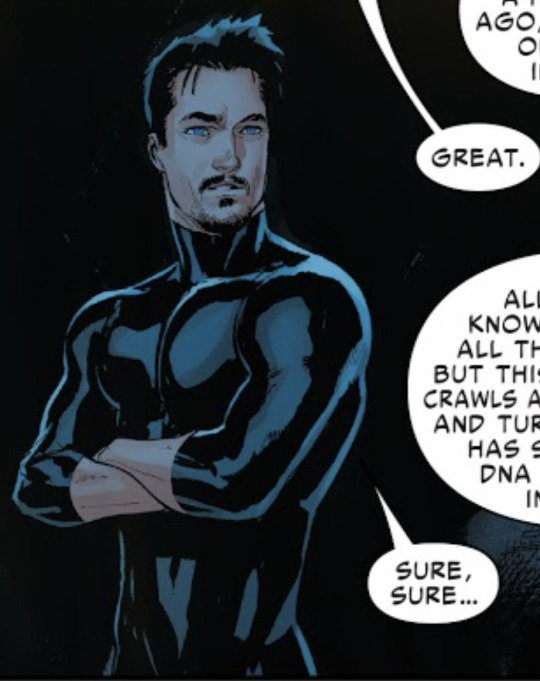
And 1872 Tony wears dirty, stinky one-piece pajamas under his armor (not sexy):

He’s so gross, he’s a mess. I love him. You’ll love him, too.
No, okay. Being serious.
616!Tony’s backstory is a lot more complicated just due to how long the character has existed, and the decades of cannon (much of it self-contradictory at points.) Like MCU Tony, 616 Tony used to manufacture weapons, experiences something life-changing, and becomes who he is as a result of this as a catalyst. 616 Tony’s backstory has been rebooted a few times, and I’m definitely not the definitive source on Iron Man lore compared to people who have read all of his comics, but I’ll try to touch on the basics.
Originally, 616 Tony Stark is shaped by his experience in the Vietnam War. This is later rebooted and changed to war in the middle East (we see this in the MCU when Tony is held captive in Afghanistan.) In both circumstances, he is taken captive after being in the air for war technology, and then he creates the suit to save his own life (losing a beloved mentor in the process, the guilt of which stays with him after.)

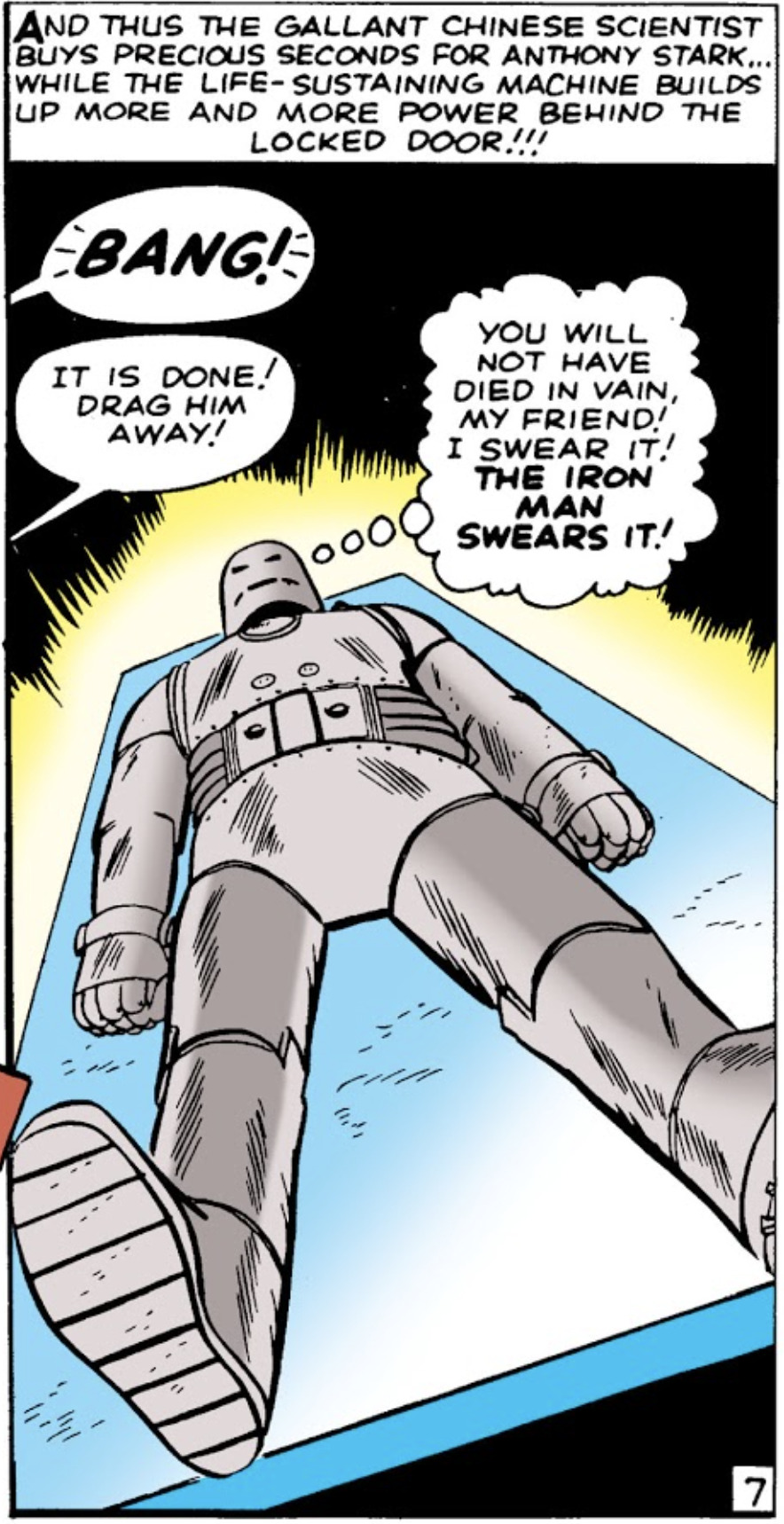
Tales of Suspense #39
In 1872, Tony’s formative event is the Civil War in some ways, but in other ways, this is only half of it, because this is not the event which causes him to build armor or set him onto his “become a better person” trajectory, like in the other comics. Mainly, the Civil War functions to cause Tony to stop weapons manufacturing and throw his life away down a bottle.
We get a flashback of Tony in the year 1862 with his female companion, picnicking and about to watch a battle, (rich people from the North did this in real life. If you’re interested, read more here!) We don’t get much of his past, but we discover that he is a rifle manufacturer and that he has created something called the ‘Stark Repeating Rifle’, and it seems that he has done so with the hope of encouraging a cease-fire, more than a slaughter.
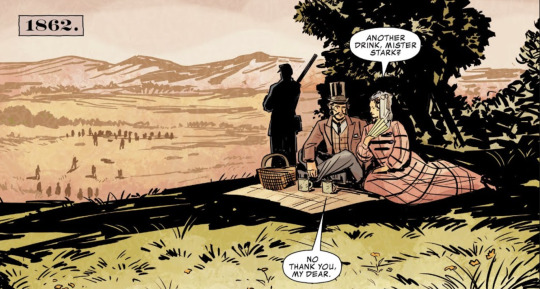
Well. We don’t always get what we ask for.



Tony vows to actually never touch a weapon ever again, and this personal oath means so much to him that he gets creative at times during 1872 when he’s being chased by baddies:
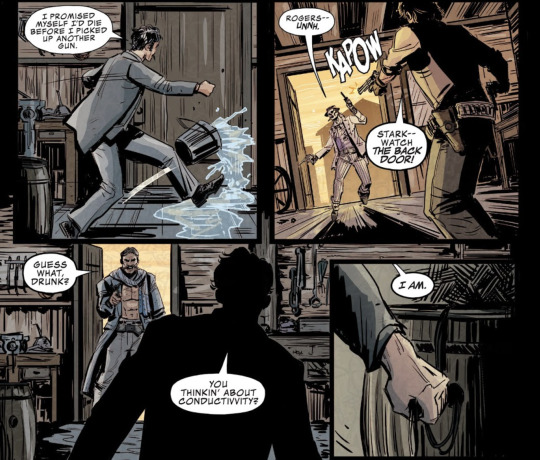
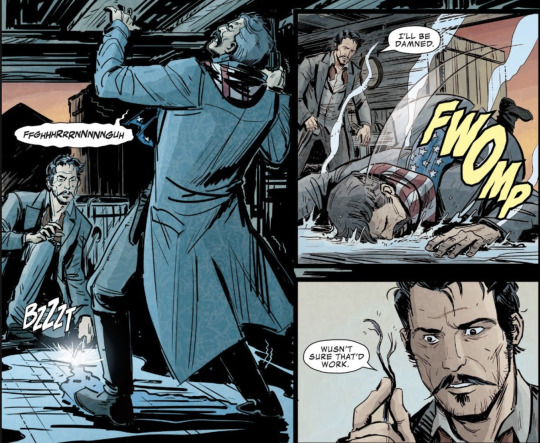
Witnessing the extreme bloodshed of the Civil War, and feeling responsible for a huge amount of deaths, Tony turns to drinking, (and presumably moves to the west to escape the Pain of his Past, but this is not shown explicitly on panel; I have assumed, though, that Tony’s weapons manufacturing company was in the East, probably Boston or New York, since he comes from family money and because the American West was still “young” at this point in time so it would be unlikely that an established business would be supplying a war from lawless territory with little infrastructure.)
In 616, it’s worth noting that Tony builds the armor to save himself from danger in a war scenario; this is not the case in 1872, things unfold a bit differently. The Civil War certainly sets in motion the chain of events that eventually lead to the creation of Tony’s armor, but he’s not in physical danger or physically traumatized by the war in this verse as he is in other verses, and 616 Tony seems to have a stronger sense of duty than 1872 Tony, but this might be a complication of the depression/apathy related to the alcoholism.
What I mean by this is that both iterations of Tony struggle with alcoholism, but differently. Mainly, while 616 Tony has several alcohol themed arcs, and hits rock bottom with his alcoholism to cope with his trauma, he is sober more than he is drunk in the comics. His drinking almost kills him, and he almost loses everything because of the drink. It’s a source of enormous shame for him.
In fact, during this time in 616, I think Tony at his lowest reminds me a lot of 1872 Tony; 616 Tony is not an apathetic person and he holds himself accountable for an obscene amount of responsibility, but during what is referred to in fandom as The Second Drinking Arc, Tony basically gives up. This is the most “like” 1872 Tony, at least at the start of his arc. Rhodey takes over the mantle of Iron Man, and 616 Tony spirals, not caring whether he lives or dies, not hero-ing certainly.
We see both versions of Tony express similar sentiments, a certain cavalier attitude about their lives (and outright suicidality at other points) with nothing left but the drink.
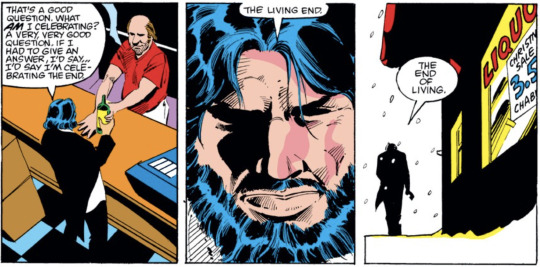
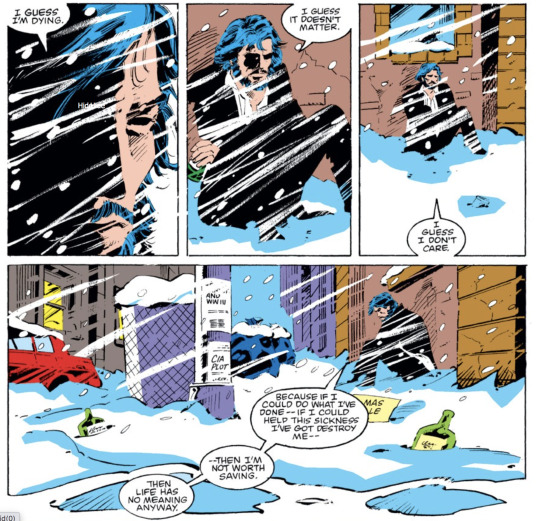
Iron Man Vol. 1 #182
Compare with:
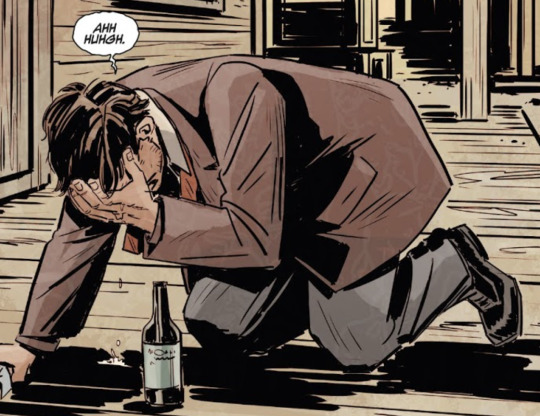
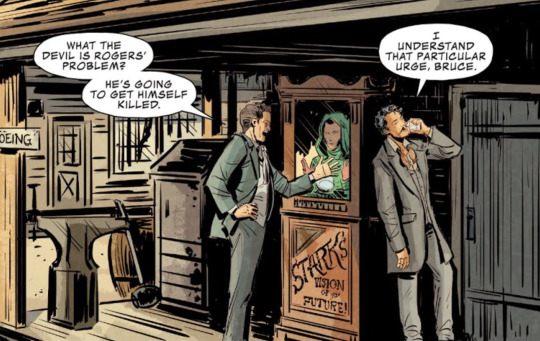
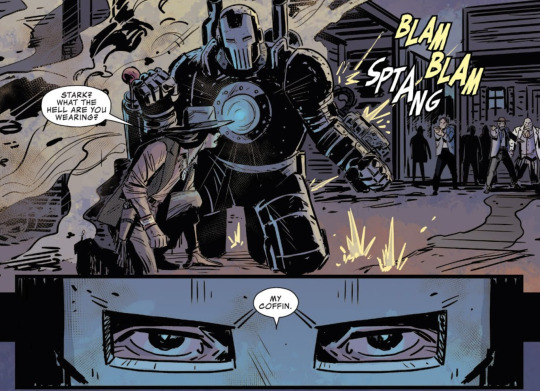
And you can certainly see a resemblance between this set of panels from IM v.1 #176 and in 1872:
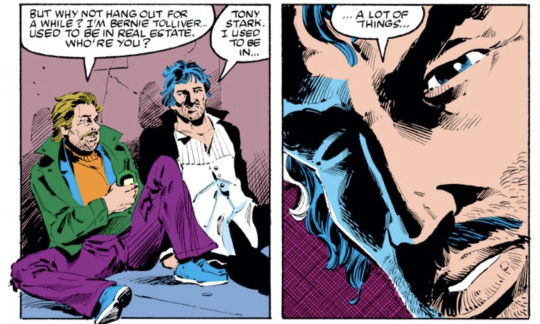
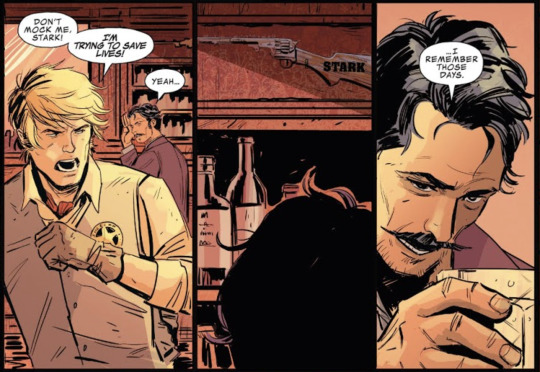
Iron Man Vol. 1 #176 and Marvel 1872 #1
It’s a little different in 1872, where his drinking really is purely a result of his existing despair, and it doesn’t cause enormous problems for him, (minor problems, sure. He spends a lot of time drunkenly singing to Sheriff Rogers, or bothering him from the inside of a jail cell.) But this Tony lives at rock bottom, whereas 616 Tony only stays at rock bottom long enough to get his life back together (as many times as it takes.)
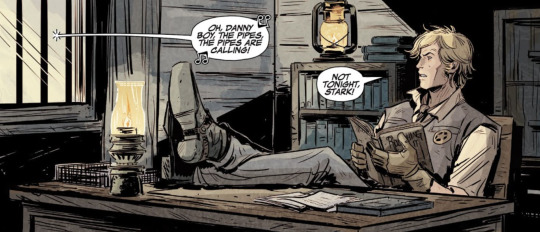
This Tony really doesn’t show any outward shame about his drinking; presumably, the people he knows in Timely have only ever known Tony as a drunk, and none of the people from his old life are here to see him like this.
This is a Tony who has essentially given up on himself and has moved out West to hide from his shame and his past; this is not a Tony who is scared of letting down his friends by drinking, or scared of shirking his “duty”, because this Tony has moved away from all of his friends and has given himself no duties. He’s a bit more apathetic, but I would argue that this is not because he inherently is a less moral version of Tony, but because in this verse, he was drinking for a very long time and circumstances unfolded differently so it took him a longer time to find that sense of purpose and responsibility (beyond just shutting down manufacturing guns,) which is awakened in him by Steve Rogers.
616 Tony’s sobriety is a major part of his character, and a conscious choice that he makes, even during some lowest points:
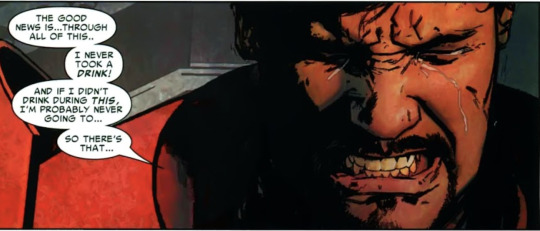
Civil War: The Confession
He takes some amount of pride in his sobriety, and when he does fall off the wagon at times (or magic makes everyone think he did,) it absolutely tears him up because 616 Tony cares very, very much about his sobriety and does not like who he is when he’s drinking. We do not know if 1872 Tony’s father had been a drunk or not, but we know 616 Tony’s father was, and that the drink lead to him treating Tony abusively.
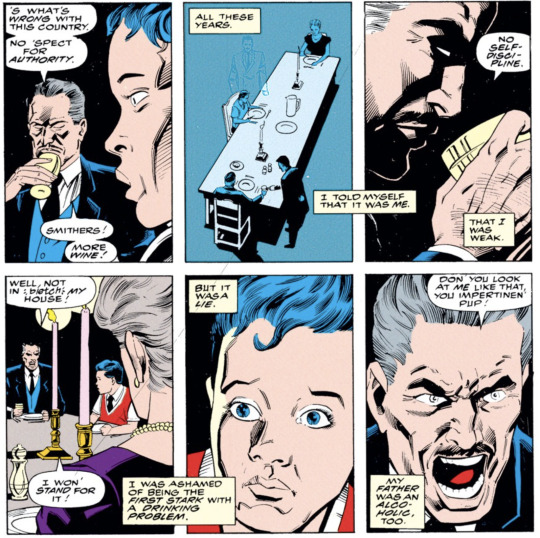
Iron Man Vol. 1 #285
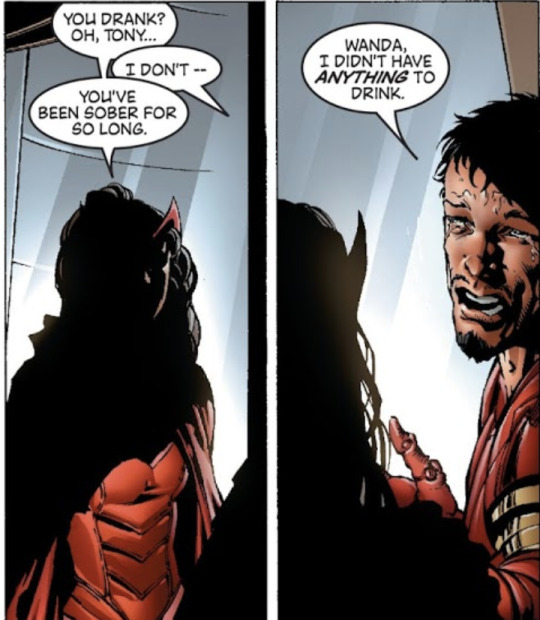
Avengers Disassembled #1 (This was when ~magic~ made Tony drunk and it wrecked him breaking sobriety without ever having actually drank. Oof.)
616 Tony’s long struggle with alcoholism is a major part of his character and he has had relapses over the years and throughout the reboots, but in general, he does not drink.
1872 Tony starts drinking in 1862 and doesn’t stop until the last pages of the story, so in terms of the cannon we have for him, he is a current drunk, rather than a former drunk. This isn’t to say he doesn’t stop; but since it’s in the last page or so, it sets the reader up to imagine his sober future, rather than exploring his sobriety as 616 does. (Calling all fanfic writers!)
Anyways, both Tony’s are excellent. Both are damaged and traumatized, both are Iron Man in their own ways, both (eventually) find sobriety, both have some cute, quippy dialogue (though 616 Tony tends to be more reserved/polite for sure, in general).
The last thing I’ll point out, is that both Tonys’ narratives are intertwined with and influenced by their respective Steve Rogers. I’m not saying soulmates but I’m saying soulmates.
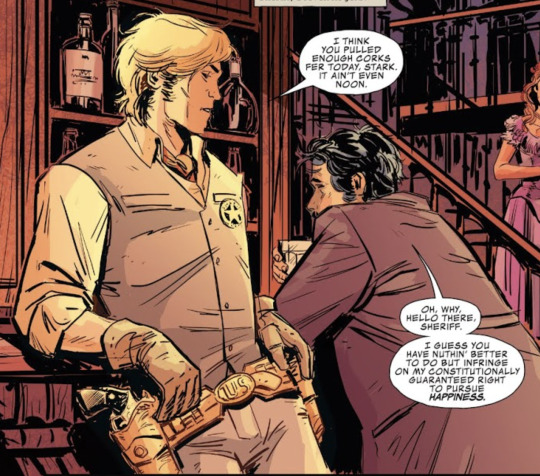
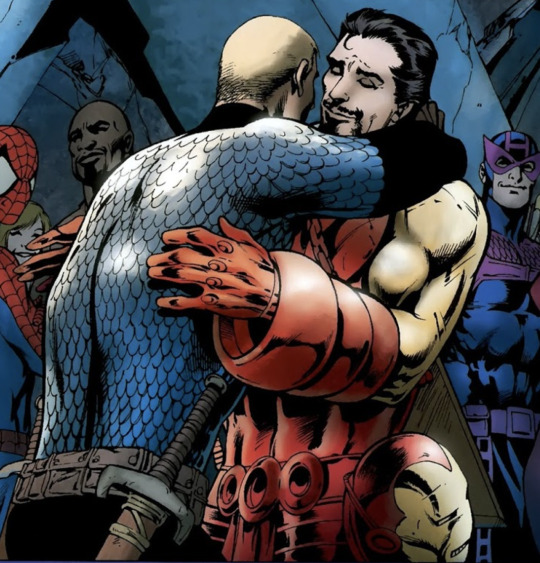
Anyways. Sorry this post got super long, and I apologize if any of it is confusing or redundant, I am not functioning at my highest capacity currently. Please read 1872. Let it rock your world. Create & consume the fanworks, I would love to see a boom of 1872 content (more than the fics and art I keep making!) And my ask-box is always open!
#Anonymous#anon#ask#1872#1872 stony#stevetony#stony#616 stony#616#han reads comics#my post#idk how to tag this my brain is fried sorry if this post is all over the place#tw suicide mention#suicide mention#tw alcohol#alcohol#tw abuse#abuse#long post#comic panels#han speaks
133 notes
·
View notes
Text
My Lesbian Experience with Loneliness by Nagata Kabi - Book Review and Impressions
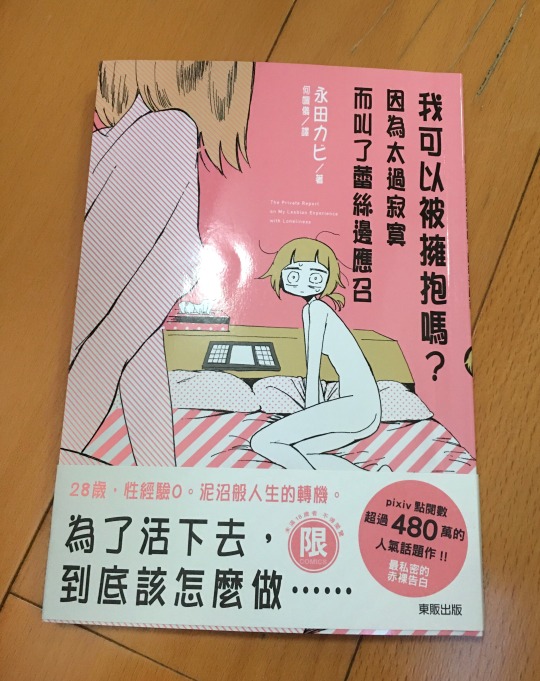
(light reflection) Perfect :D Hoping Tumblr doesn't flag me for this xD
Ok, I'm going to start this off with 'this is probably the first and only book review I'm going to do' xD Because I rarely do read books now, and just as rarely buy them. Also, I would have preferred to buy the English version but alas they only had the Chinese version in stock ^^"
Stumbling upon this on the Internet, I was immediately compelled to buy this, as if I knew I would love it and that Nagata's story would resonate with me.
【Short Version】 I can't recommend this book enough, it doesn't matter what sexuality you are or from what culture are you. Nagata makes sure to tell an honest and 'naked' (without embellishments) portrait of her own personal experiences. How she herself is a college drop-out (having only graduated from high school), pushed herself to live/work while struggling with depression and eating disorders, not being sure of what she wants and feeling that she doesn't 'deserve' things, realizing her own sexuality in that she likes girls, and just not feeling 'good enough'...all through her cutesy and unassuming art style.
I will say again though, cutesy art style aside, the book deals with some very heavy topics. Nagata is very honest and doesn't shy away from the gritty details, and I admire her all the more for doing so. Many yaoi and yuri comics often portray an unrealistic and fetishistic view of the LGBTQ+ community whereas Nagata's story is much more grounded and sincere. This is not an easy read, but it's not an overly depressive one either. Nagata literally struggled for years with her mental health, but ultimately found light on the other side. Not mainly through the help of others, but through her own choice to forgive and love herself.
5/5⭐ Definitely recommend and would read again. And if I could, I'd give Nagata a big hug and a heartfelt 'thank you' for sharing her story.
【Long Version】 While it's written primarily from an Asian (particularly Japanese) perspective, Nagata's experiences are ones that should resonate with anyone who has been through the same or similar things, regardless of one's personal background. And I myself, while being fortunate enough to not have gone through eating disorders or self harm, am no exception.
I grew up in an Asian (Taiwanese/Chinese Filipino) household, while my parents weren't Tiger Parents (no offense but fuck Amy Chua for thinking that's a proper way of raising your children), they still had certain expectations on their children: to find a good husband/wife, have a good education, have a 'stable' career, etc. And while I love my parents very much, I'd be lying if I said there weren't any times where I felt they were smothering me, there weren't any times where they kept on nagging and bugging me for very trivial details. My biggest pet peeve: guilt-tripping me just for wanting to spend time alone.

"For me, my parents' opinion of me is absolute." (NOTE: While I won't be providing exact translations of the excerpts I used here, I'll do my best to summarize the gist of them.)
At the same time, I cared very much about their opinion of me. I made it a point to do well in school, to do things according to their wishes, and just like Nagata, I didn't know what I wanted. This even extended to caring about others' opinion of me, more than my own. In my freshman year of college, I 'went along' with being friends with someone, who while was nice to me, turned out to be a manipulative bitch skilled in passive-aggressiveness xD Being half-Taiwanese/half-Filipino, it was hard to fit in since people always treated me differently, it didn't occur to me I could be choosy with friends, I thought as long as they were 'nice' to me, that would do.
Asian culture is largely a collective one, where we define ourselves by our relationships with others, compared with Western culture (primarily America, I'll be using America as a reference point) where individualism is absolute, where you define yourself as you like. In Asia, it's also normal for children to still live in the same house as their parents well into adulthood, compared with Americans who are expected to move out the house once they finish high school or start college, and they're quite literally 'on their own', having to pay their own tuition, rent, etc. Where I live (Taiwan), it's normal for adults to continue relying on their parents financially well until college. Nagata for instance, while saying her parents really make her feel so pressured, is grateful that she still had a home to stay in (and she's 28!).
If you ask me though, neither a collectivist culture or an individualist culture is absolutely good nor bad. Each have their own pros and cons, and both Asian culture and Western culture could learn a thing or two from each other.
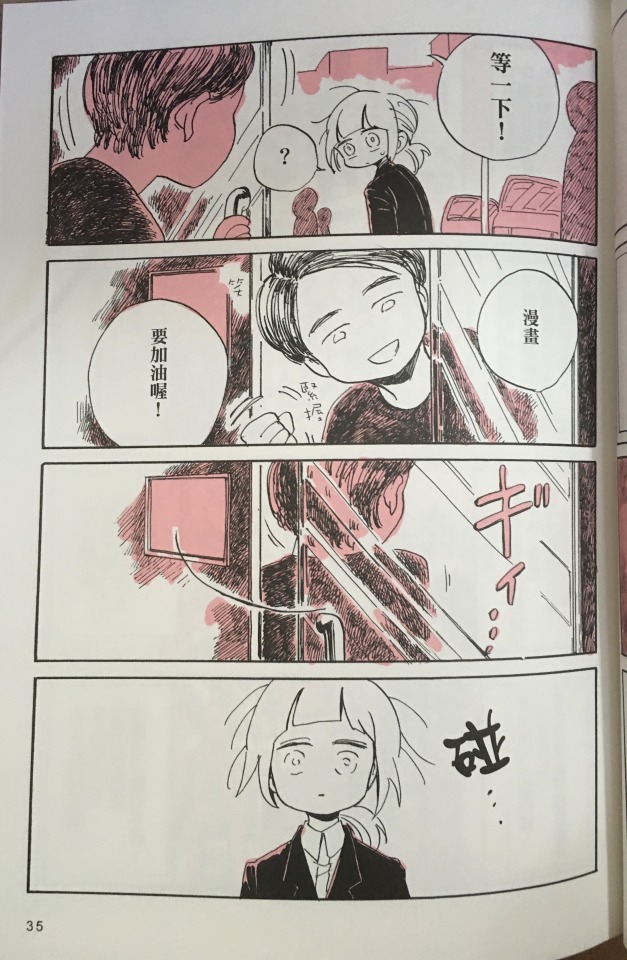
After going through quite a few job applications, one of the interviewers tells her "Ganbatte!" (You can do it!) after Nagata tells her what she really wants is to be a manga artist.
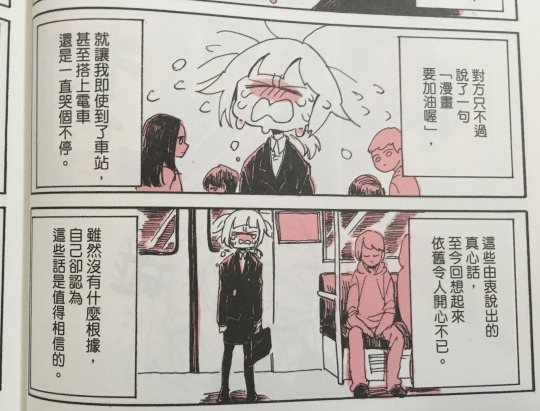
And sometimes that's all we need really, a small gesture or kind remark can do wonders. Even if there's no base or reason for it, it's something worth believing in.
I often have doubts if I'm doing what I really want, if I chose the right major for college, if I'm doing the right thing, if I'm 'good enough'. I didn't grow up with much self-esteem as a kid, and often derived my value from others. But even at my lowest times, a 'you're doing ok' was very reassuring to me, be it from family, strangers, or people I care about. Sometimes that's exactly what we need, it may be small but it could be the difference between continuing to wallow in depression or re-evaluating and choosing to be better to oneself.
I find it's really important to know, that however alone you may feel sometimes, there are other people out there going through the exact same thing. It's something universal, and while a lot of things are really unfair in life, each person has their own lot or burden to deal with. I have a Taiwanese friend who, while being more financially well-off than me, has terrible parents. And I mean parents who are quite so literally toxic, unsupportive of her, and would outright say the worst things to their own daughter.
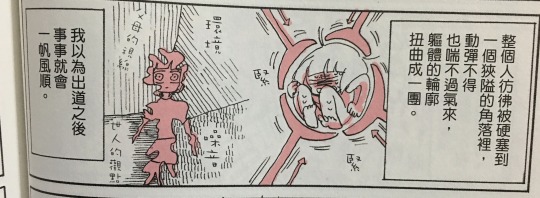
How depression and anxiety can feel sometimes, we can literally feel like it's impossible to breathe and be in a state of disconnection from the world.
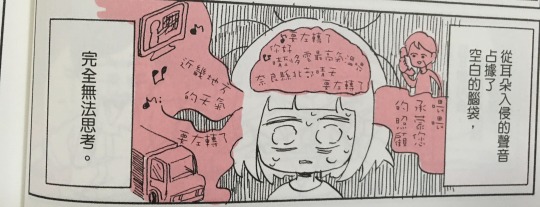
"The sounds that invaded my ears occupied my empty brain, making me unable to think at all."
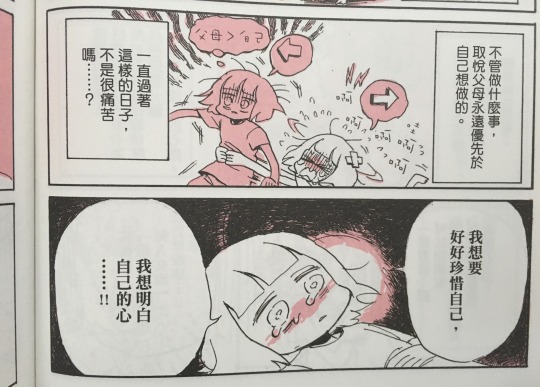
If you only did what your parents asked you to do, wouldn't days like those be very painful? In the end, only you can understand what you really want.
Nagata's art style is one I would describe as simple, cute, and effective. I personally think had her story been drawn in a more serious style, it would have been even harder to read, much less finish. It's also a choice that has artistic appeal to me, serious subject matter juxtaposed with a 'kawaii' art style.
Nagata also depicts very well her mental state and thoughts throughout her struggle and journey to self-actualization. Depression is a really tough thing to deal with, and sometimes we don't even realize that we have it or if we do, refuse to acknowledge it. In Asian cultures especially, mental health has always been something of a taboo subject and there is a very heavy social stigma associated with it. Nagata herself even said that her parents seemingly refused to acknowledge that their daughter's mental health was in a state of distress. In Japan, there is a concept called gaman (我慢), which is described as 'enduring the seemingly unbearable with patience and dignity', and while it is portrayed as an ideal virtue that inspires perseverance, it can be a source of heavy pressure for others. Gaman also means that you are expected to suppress whatever emotion or negative feelings you have, often for the sake of others and no matter how tough the situation becomes for you. And while I agree that through gaman you can become more selfless for others, it shouldn't have to come at the expense of your own well-being.
I was quite fortunate to have grown up in a more liberal Asian household, but even when it came to mental health, our family also adopted the same kind of attitude towards it, by carrying on as if nothing was wrong, or just not talking about it. And to be honest, there were numerous times I wished we had been more open about what was bothering ourselves at that time. Talking and being open about your feelings is not a 'weakness' but something incredibly brave to do, and it's my wish for that to slowly become more acceptable in Asian cultures, which I know is kind of a stretch, but it doesn't hurt to hope.
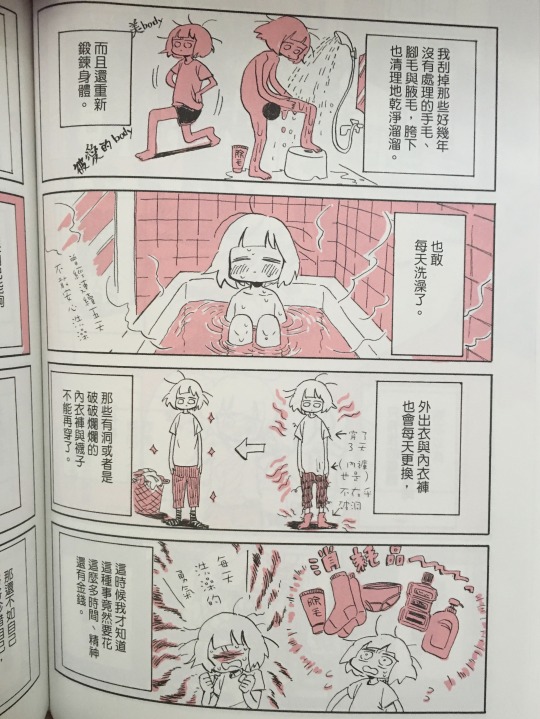
Nagata makes the decision to clean herself up, by taking a bath everyday, habitually exercising, and no longer wearing worn-out clothes.
Depression especially can be a bitch. It deprives you even of your physiological needs, like your need for food. Nagata had to struggle with that on top of eating disorders for a long ten years. She ate so little and even felt that she didn't 'deserve' to eat, and at one point, anorexia became hyperphagia, and she would feel so guilty for eating almost expired/expired food. Things that would otherwise be simple to do also end up becoming difficult/impossible to do, like taking care of your personal hygiene, getting up from bed, doing simple tasks etc.
Thankfully, after Nagata realizes that she never truly 'valued herself', she starts to turn over a new leaf. Even just starting with cleaning herself up, she takes this as a form of 'valuing oneself' and her mood starts to improve, which her family also points out. In the end, taking care of yourself is not a selfish thing to do, it can even make you a better person who is there for others.
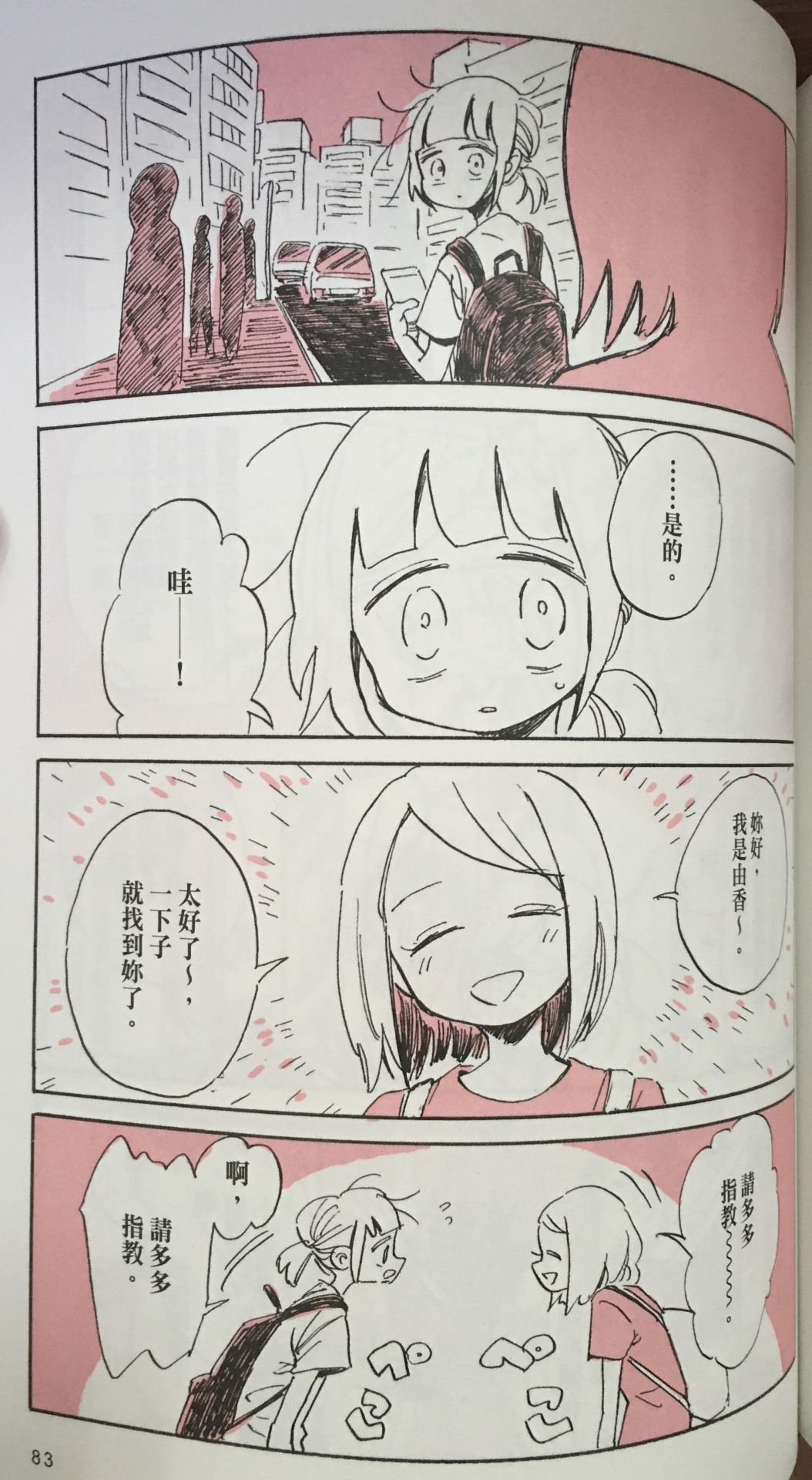
Nagata meets up with the female escort she hired, as a means to experience human sexuality, which she had always repressed her curiosity for and treated as a taboo subject. (NOTE: And I'm glad that she met a really nice girl for her first time too!)
Sex and sexuality is also a subject that I feel is hard to talk about sometimes, which I think also owes itself to most Asian cultures being relatively conservative about it. I myself have only recently identified as bisexual, which I attribute to internalized homophobia, not wanting to admit I was into girls too. And to be honest, 'coming out' is something I'm still uncomfortable about, because I don't want to risk my relationship with my family and it's still something I would choose to be selective about with colleagues and friends. I'm grateful though that as crazy the Internet can be sometimes, it can be quite accepting and tolerant towards things that we wouldn't otherwise discuss with even the closest people in our circle. Nagata's memoir ended up capturing the hearts of many readers ever since she first published it on Pixiv.
Exploring your sexuality doesn't have to be scary, it should be something exciting and liberating. Nagata decided to take matters into her own hands, and while the days leading up to the encounter made her really nervous and she even considered not going through with it at all, she willed herself to continue, because she wanted to do this for herself, it would be pointless if she gave up after coming so far in her decision to value herself.
And it's these series of actions that she decided to do that ultimately led to her life turning out for the better, it gave her the courage to do what she always wanted: to be a manga artist, which lead to the publishing of this autobiographical memoir, something she wanted to create that would 'make people want to buy this book' and from her own preference for reading stories that 'speak of secrets people wouldn't want to tell others'.
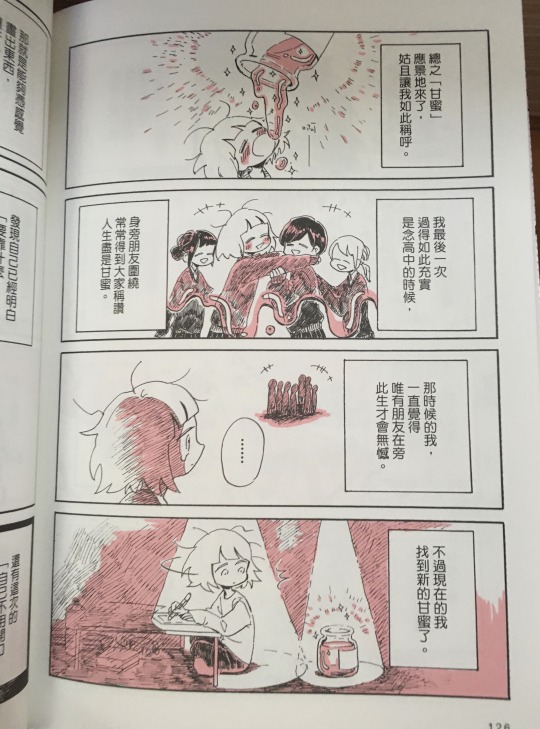
Nagata mentions what she calls 'honey': something that varies from person to person. It could be your reason for living, that thing that drives/pushes you, or even your sense of belonging. It may not be something permanent, but you can always find yourself a new one. (she mentions the last time she had her 'honey' was during her high school days, and while she has grown apart from the friends she made, she has found her new 'honey' in the form of being a full-time manga artist.)
Nagata stumbles and trips a lot on her way to being a better version of herself, but who doesn't? She admits to things not necessarily being smooth, but at least she's doing better than before. And it's that decision to at least try that counts. We don't have to be perfect, we're all human after all.
TL;DR My Lesbian Experience With Loneliness is a honest, down-to-earth, and ultimately hopeful memoir about the struggles of mental health and learning about one's sexuality. It's an amazing book, and very much worth the buy.
A big thank you if you read through all of this too. I know it's a mess and writing isn't exactly my strong point, but hopefully I've convinced some people out there to give this book a read! Please feel free to share your thoughts and I'd appreciate it very much too if you reblog/like this post.
#my lesbian experience with loneliness#the private report on my lesbian experience with loneliness#nagata kabi#kabi nagata#yuri#girls love#gl#lgbtq#lgbtq+#lesbian#lesbians#comic#comics#comic books#books#book review#graphic novel#web comic#pixiv#mental health#tw depression#tw suicidal thoughts#tw eating disorder#tw self harm#personal stuff#taiwan#philippines#japan#asian#I wrote something xD
21 notes
·
View notes
Text
TerraMythos 2021 Reading Challenge - Book 21 of 26
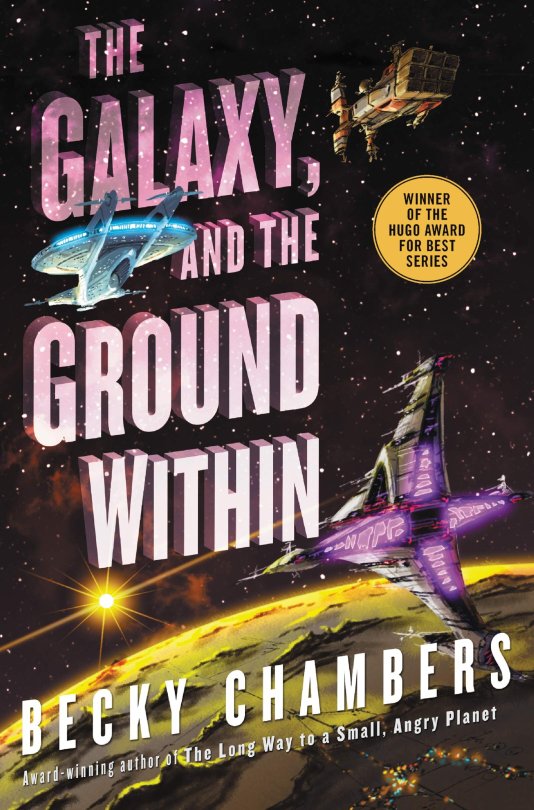
Title: The Galaxy, and the Ground Within (Wayfarers #4) (2021)
Author: Becky Chambers
Genre/Tags: Science Fiction, Third-Person, Female Protagonists
Rating: 9/10
Date Began: 8/15/2021
Date Finished: 8/22/2021
Gora is an unremarkable planet. It has no natural life and few resources to speak of. In fact, its only use is its proximity to more interesting places. Over the years, it’s become a waystation, notable only as a temporary stop for travelers as they wait for their spot in the wormhole queue.
The Five-Hop One-Stop is a small, family-owned rest stop on Gora. Three travelers— a marginalized nomad, a military contractor, and an exiled artist-- lay over at the Five-Hop awaiting the next stage of their journeys. But everything goes horribly wrong when repair work on an orbital satellite causes a cascade event, destroying the planet’s communications. Now stranded on Gora with debris raining down from the sky, the travelers and hosts must live with each other while cut off from the rest of the galaxy. As they learn more about one another, each is forced to confront their personal struggles… and challenge their perspective on life.
Speaker had a word for how she felt right then: errekere. A moment of vulnerable understanding between strangers. It did not translate into Klip, but it was a feeling she knew well from gatherings among her people. There was no need being expressed here, no barter or haggling or problems that required the assistance of a Speaker, but errekere was what she felt all the same. She’d never felt it with an alien before. She embraced the new experience.
Content warnings and spoilers below the cut.
Content warnings for the book: Non-graphic sexual content, child endangerment, ableism (if you squint; it’s not malicious), references to warfare, discussions of intergenerational trauma re: colonization (not the scifi kind), prejudice and xenophobia, recreational drug use.
I’ve had a mixed experience with Wayfarers, which is unusual for me. I can’t remember the last series I read that fluctuated so much in terms of personal enjoyment and (in my opinion) quality. People as a whole seem to enjoy this series more than me, hence the multitude of awards and glowing reviews. I liked book two, A Closed and Common Orbit, because of the focused narrative and dedicated development of two lead characters. But the first and third books suffered from an overly large cast and reliance on generic archetypes. When a series is built on character development and plot is a secondary concern at best, those characters have to be outstanding. And to me, they usually weren’t.
But in this fourth and final book, I felt that Chambers finally hit her stride. On a surface level, The Galaxy, and the Ground Within has striking similarity to book three, Record of a Spaceborn Few. Both are virtually plotless novels which do deep dives into a cast of characters. What sets The Galaxy apart is its execution. All three leads have unique and compelling personal conflicts. An underutilized strength of the series is its creative aliens; something Chambers takes advantage of here with a fully alien cast. Finally, this book hinges upon interaction between the three leads, something sorely missing from the previous book.
In these reviews I often seem critical of ensemble casts. But when done well, I actually prefer them to singular narratives. The main hurdle is having consistently interesting characters across the board. When there’s one or two characters I prefer over the others, I usually struggle with the novel. There’s an inherent sense of disappointment when leaving a favored character’s POV. For me this affects my overall enjoyment of the story. But when I like all of the characters or they all have something interesting going on, ensemble casts are great. The Galaxy, and the Ground Within is successful in this regard because I thoroughly enjoyed all three perspective characters. In no particular order…
Speaker is an Akarak, a birdlike scavenger species introduced as sympathetic antagonists in the first book. Going in, we know their home planet was colonized by the Harmagians, which has caused irreparable harm to their culture. Robbed of their homeworld and forced into the margins of GC society, the Akarak are nomadic, and many of them rely on banditry in order to survive. We have seen very little of them besides that. The Galaxy expands their lore a lot; their short lifespans, their incompatible biology with other sapients, and the resulting generational trauma from centuries of colonial exploitation. Speaker’s arc in particular is about dealing with the prejudice she encounters daily, adjusting to acceptance after being othered for so long, seeing things from a new perspective, and persistent worry for her twin sister Tracker, who she’s been separated from due to the events on Gora.
The Aeluon Pei is actually a recurring character; she’s Ashby’s love interest from the first book. Here we get a more intimate view of her as a person. In particular, she struggles with living a double life. She works a prestigious yet dangerous job among her people, running cargo into critical warzones. But her affair with Ashby (a Human) is a huge cultural taboo among the Aeluons. If her colleagues discovered her romantic relationship, her life as a cargo runner would be over. The double life is wearing on her, because she loves both aspects of her life, but knows that it can’t go on like this forever. To make matters worse, she goes into “shimmer”, a once-in-a-lifetime fertility period, during the events on Gora. This adds a layer to her struggle; does she do her duty to her species and produce a child, or does she pursue what she really wants?
Finally, there’s Roveg, a Quelin. Like the Akarak, Quelin haven’t received a whole lot of development in the series. In the first book, they’re portrayed as a xenophobic insectoid race, and their role is unambiguously antagonistic. Roveg is the polar opposite of that. He’s something of a renaissance man; an appreciator of fine art and dining, who designs artistic sims by profession. He delights in meeting aliens, befriending them, and learning everything there is to know about them. His arc centers around his exile from Quelin society and all the hidden pains associated with that. Chief among these is a mysterious meeting he has to make— which the Gora disaster obviously complicates.
Complementing the three leads are the Five-Hop’s hosts; a Laru mother and child named Ouloo and Tupo. Similar to the Akarak and Quelin, we haven’t seen many of the Laru (who I always picture as fuzzy dog-giraffe hybrids). Ouloo struggles to be a kind and accommodating host in the wake of disaster. She’s also forced to confront her own prejudices, especially regarding Speaker, the first Akarak she’s ever met. The two initially have a lot of tension, but grow to be great friends over the course of the novel. Her child Tupo is a nonbinary character using xe/xyr pronouns throughout the novel. Xe’s basically a Laru teenager, and super endearing. I love xyr natural curiosity and naiveté. Definitely the “heart” of the group.
Interaction between these characters is the bread and butter of this novel. There’s very little action; instead it focuses on their differing perspectives and life experiences. It’s a gradual build as the characters grow more familiar with one another. The epilogue is brilliant, because we see the long-term effect of these characters meeting. Despite interpersonal conflict in the story, Speaker inspires Pei to make a specific decision. From this decision, Pei realizes she can help Roveg with his meeting. As a result of this, Roveg is inspired to help Speaker based on one of their earlier conversations. His help fundamentally alters Speaker’s perspective on life— and there’s an implication it will reach beyond that, to the Akarak as a whole. It’s a cascade effect, but rather than the disastrous version that happened on Gora, it’s a positive social change for the leads. That’s the kind of literary parallel that really fires me up.
I do have a few criticisms of this novel, minor and otherwise. The first is, I wish the tension between Speaker and Pei was more strongly built throughout. While I’m glad the novel isn’t all sunshine and rainbows when it comes to the character interactions, their conflict goes from an idea in the back of one’s mind to an explosive event. This is something of a nitpick because it’s otherwise well executed. I especially like that despite their interpersonal problems, they work together in the climactic events of the novel without sacrificing their respective principles.
My other criticism is a series-wide observation. Wayfarers is optimistic to a fault. As such, it’s pretty rare that we see true evil or even bad behavior in this series. On one hand, it’s nice to read something where the characters are people who want the best for everyone. But there’s a lot of dissonance here, because there are MASSIVE social problems with the GC at large. For example, we see the effects of xenophobia, war, slavery, and colonialism, but the ones who perpetuate these issues are faceless. If Chambers wants to portray good characters, that’s fine, but it strikes me as odd to build complex social issues into your society, yet exclusively portray groups of morally good people. Why would a society full of such nice, helpful groups also marginalize the Akarak, or create an entire caste of slave clones to sort through their junk? This approach comes off as a desire for nuance without committing to it.
This trend continues through the final book. The Galaxy, and the Ground Within is clearly a COVID-19 response novel (“we’re all in this together”!)— but everyone is blameless, and the government response is reasonable and timely. That’s just not how it worked in real life. So many people were (and still are!) selfish in response to COVID, often outright endangering others. Practically every government botched their response for the sake of money, leading to mass death worldwide. If Wayfarers has similar social issues to the real world, why would the response to a disaster be any different? It’s an ongoing contradiction; the Wayfarers society is simultaneously utopian and flawed, and it’s hard for me to suspend my disbelief.
As an individual novel, though, I really enjoyed The Galaxy, and the Ground Within. Like all the other books in the Wayfarers series, it’s a standalone and can be read on its own. My experience with this series has been up and down; I recommend the second and fourth books, but I’d skip one and three if I ever do a reread. There are things to like about Wayfarers in terms of worldbuilding and the creative ideas behind all the different aliens. Characterization is hit or miss, but the hits are great, and this book in particular knocked it out of the park. Chambers’ prose improves a lot over the series, and it’s nice to see how she develops as a writer. As I’ve mentioned, Wayfarers has gotten lots of positive feedback, so it’s possible you will enjoy it more than I did. But I’m looking forward to reading something new.
9 notes
·
View notes
Text
Assorted House of Feanor Thoughts
I wrote this as a reply to someone, but then realized that this should be a post of its own.
Line between extrapolation, interpretation & headcanon is going to be fluid here
Long post under cut
The seven sons in general:
all moody, fierce, intense and brilliant, each in various different ways
none of them can really stand to be cooped up in one place for long
F R E C K L E S you will not convince me otherwise
Apart from the ones explicitly described as pretty (ie, Maedhros and Celegorm) they’re actually relatively plain by elf standards, or at least sort of rugged-looking, especially compared to their part-Vanyar cousins - I mean, figures that some would turn out more like Miriel or Nerdanel both of which were supposedly more average.
all are very resourceful having spent most of their lives helping out with their parent’s projects, exploring the wilderness, or (save for Celegorm) hanging out in Aule’s halls. Most can probably whip up a steampunk or magitech solution to basic war-related problems
Because of this they’re a very tight-knit group
growing up, they did not know many children their age; Ironically the most contact they had was with their cousins because Feanor paid semi-regular visits to Finwe. Apart from Turgon (and Orodreth if you place him in the second rather than the third post-journey generation) the cousins really dug the adventure stories. (Galadriel pretended not to be interested and offered plenty of critiques, but listened anyways)
more survival skills and just a lot more casual than your average princes
They’d all been adults for a good while by the time of the rebellion; the twins are a tad older than Aredhel, Galadriel and Argon; Caranthir and Angrod are about the same age. Curufin is younger than Aegnor.
They all look back at that trip to the lightless shore of the outer sea as a cherished family memory
Also I don’t think Feanor disciplined his sons very much after all his own father let him get away with everything. In his eyes the brats can do no wrong especially not Curufin and to a lesser extent Amrod Nerdanel tried her best to counterbalance this and it kind of worked on some of them, but the three middle ones were a lost cause
I think a lot of the weight behind the oath comes from how Feanor made them promise him to see it through on his deathbed. It was his literal last wish.
Maedhros:
The Leader™, the most strong-willed and the deadliest fighter by a huge margin. What the orc under your bed has nightmares about.
Obviously a very competent diplomat, strategist, and the sort to put constructive results over personal glory; resilient, formidable, unpretentious and tough as leather
but not at all overconfident, and the type who is not blind to the flaws of the people he loves. He knows very well that Feanor wasn’t perfect and does many things that his father would not have agreed with - at the same time he has a strong sense of obligation, honor and loyalty which turns out to be his fatal flaw in the end when being loyal and keeping his word increasingly requires him to do dishonorable things
if there was a definite breaking point it was the fiasco with Dior’s sons
Stoic but courteous and eloquent; From Finwe’s death onwards increasingly grim, grizzled and not very hopeful, though he’s the sort to give his all and try to be noble even when there’s no reward or even thanks or respect.
Despite this, he has as a dry sense of humor and at times uses it to defuse tense situations or disarm people he’s negotiating with (see the scene with Thingol’s message) - does have a streak of gallows humor to him especially after the Thangorodrim incident
As the heir Feanor actually let him in on trade secrets and scientific speculation; Their relationship is probably the most equal; I do think Feanor was capable of actually appreciating that Maedhros got a mind of his own and isn’t afraid to stand up for himself. Feanor values independent thought, even if he’s not always good at really living that value with his tendency to take things personally and see others as taking sides for or against him.
Can’t really craft stuff to the same degree without his right hand. He then focussed on more abstract/mental pursuits which were perhaps his forte, to begin with but it still bothers him more than he lets on, especially since he still retains, or swiftly regained, his skill at making things dead.
He may or may not qualify as a cinnamon roll but he definitely looks like could kill you
Maglor:
Maedhros might have been the token responsible sibling, but Maglor was the understanding, comforting one and always had a nurturing streak - hence why he was the one to take in the kids.
Sensitive Artistic Type™ - goes from quirky and passionate back in Valinor to melancholy & tormented as the war drags on
one of those people who despair over & get self-critical over their work even when it’s regarded as masterpieces
Like Feanor and Miriel before him, he tends to get super absorbed in his work/art and just plain disappears for days
Now some ppl hold that he didn’t start having second thoughts until near the end, but judging from how he comes along to Fingolfin’s party or to hang out with Finrod, I’d hold that he was always ‘the nice/gentle one’, but not solely in a positive way; Unlike Maedhros he did not stand up to Feanor about the thing with the ships and indeed lets Maedhros talk him out of turning himself in at the very end, so he’s probably somewhat lacking in assertiveness
Even so, he’s probably one of the better fighters, given the difficult territory he gets, that he’s the one to kill Ulfang, and how long he survives. He probably feels ambivalent about this.
I imagine him having an agility-based fighting style
Probably codified the heroic epos as a specifically Noldorin art form
Celegorm:
A lot of ppl focus on the barbarian aspect, but I’d say he actually has some degree of ‘subverted prince charming’ going on, with how he sweet-talks Luthien at first before throwing her in the dungeon, and how he seems to have been one of the more accomplished ones, joining a respected order and all
He’s actually pretty elegant and perhaps playfully gallant, but it’s a facade; He’s an animal underneath; though his instincts are probably somewhat nobler than what ends up happening when he gets roped into Curufin’s schemes
usually, the first to react and leap into action when something happens.
Herculean strength, daunting presence
also a fairly efficient general, if a bit of a glory hound and pretty fearless in the pursuit of victory
very much has an ego and doesn’t like being humbled at all
Strikes me as the sort of person who would take badly to the realization that they can no longer return to the glory of the past or being judged unworthy, not that he’d respond with anything but defiance
Wrestles giant monsters barehanded
Always low-key wished to fight creatures of darkness before the rebellion to test his might against them; Orome and the Maiar members of the hunt would have told stories of them
though he gets his pretty face from Daddy, his strong build comes from Nerdanel, possibly somewhat accentuated by his being a dude
Caranthir:
grumpy, moody, no filter, likes his alone time, shows his feelings mostly through actions, also somewhat pragmatic
the quartermaster; Actually one of the smarter ones, if not outright the second smartest after Curufin, though he has more a logistic/administrative sort of intelligence
generally one of the more prosaic, practical family members, or maybe he’s just more subtle about his dramatic side or has a harder time expressing it. Definitely has Hidden Dephts™
I mean, putting your hideout on the slope of a mountain near a deep, dark lake circled by mountains? Goth AF. A+ aesthetic there.
Hosts the family get-togethers at his fortress. Has most certainly shoved Celegorm and Curufin in the lake at some point
has a certain respect for strength, valor and skill even in ppl he doesn’t necessarily like; Not at all diplomatic or polite, but also not finicky or fastidious, so actually forged a whole lot of alliances on a “everyone’s money/swords are equally good and we don’t have to set conditions” basis and seems to have been pretty successful at this
started out haughty but definitely learned to be more open-minded/ broaden his horizon over his time in Beleriand - but as no good deed goes unpunished, Ulfang happens
Whereas Curufin and Celegorm can put up a noble veneer but will totally stab you in the back if provoked, Caranthir’s sort of the opposite, in that he’s rude and quarrelsome on first contact but has a good heart deep down (see the Haladin incident) and doesn’t keep grudges long term once he’s done grumbling where Celegorm is sore loser and Curufin a spiteful twerp.
though personally, I don’t see Caranthir as trying to reign himself in. He wouldn’t really be known as “the harshest” in that case. Who was gonna teach him to behave himself, Feanor maybe? kek.
Curufin:
We have a lot of actual dialogue & description for him - he has this characteristic little defiant smile, is often coldly contemptuous in tone, some level of ruthless pragmatism
has mild/vague foresight - nothing as impressive as what Finrod and Galadriel have, but he has it more or less to the degree that Feanor did.
actually pretty insightful, thought-through and political-minded in some ways, too bad he shares Feanor’s tendency for unwarranted suspicion and factionalism, as well as a tendency to just act on his own without checking with anyone
always either filthy from work or fully blinged-out and impeccably groomed, no in-between
more calculated and subtle than Feanor - not that Feanor ever needed calculation or subtlety since he could get by on sheer awe or intimidation. Celegorm and Maedhros have that same quality in spades and Curufin’s a little bit jealous
Not actually that much older than the twins, but always acted older than his age, especially once he heard that Feanor was the same
collects weapons, loves fancy horses, the most traditionally aristocratic of the seven
Got married relatively young; saw it as a matter of honor to further his family’s line
continued his scholarly pursuits in Beleriand; this is part of why he elected to share a territory with Celegorm
The last Celebrimbor ever heard of him was a magically sealed box filled with research notes he sent out in case he didn’t make it out alive
Did not take his parents’ estrangement well and is stubbornly salty toward Nerdanel (though deep down he misses her as much as his brothers if not more)
Frequently the Bad Influence/ Shoulder Devil to his brothers.
But when he gets excited about his research/craft he’s got this “exited cocky little boy” side to him that’s surprisingly pure.
Only Nerdanel and possibly Celebrimbor’s mom are allowed to call him ‘Atarinke.’ His brothers might still use it when they’re teasing or scolding him.
The Twins:
Every time a fic does something else with them than “generic prankster redheads” I cry with joy
We don’t have that many data points on them, but most of them suggest they’re every bit as fierce as their brothers
they’re somewhat aloof & mostly do their own thing;
As kids they’d mostly sit in a corner and play with each other. Possibly deliberately played up their identicalness as a kind of emo fashion statement / to fuck with people (”Should we do this Ambarussa?” - ”I don’t know, what do you think, Ambarussa?”)
never really gave up their semi-nomadic ways
Compared to Celegorm they probably more on stealth and precision than strength and bravado. They suddenly appear in front of you, and bam! You’ve got an arrow poking out of your face. Probably the ones scouting the perimeter of the camp.
Amras is a bit sassier, but it’s actually Amrod who’s a little bit braver.
Hardly ever argued until their parents’ estrangement; That led to quite a few quarrels between them.
For all his faults, Feanor made a point of doing things with each of them individually.
quietly nursing some level of pent-up despair and frustration until they push for the assault on Sirion
In the version where one of them dies, and then no one ever talks about it, - I imagine that the remaining one ended up cynical in a “let’s just get it ever with we’re already doomed after all’ kind of way
Bonus:
Celebrimbor
“Curiosity killed the cat but the second mouse gets the cheese” incarnate. He’s a sweet, excitable, deeply good guy, but Curiosity is the strongest force within him, besides maybe “think of the potential”
very bold in his thinking, not held back by any conventional boundaries. This is partially why he ended up more independent than his father and uncles but ironically that might in a sense make him more similar to grandpa than any of them
Really looks like Feanor. Like, Arwen and Luthien level of resemblance. It takes ppl a bit to notice because of how different his general demeanor and surface-level personality is.
Very scattered and absent-minded, prone to sudden flashes of inspiration, often shows up in some form of disarray
spent his adolescence at Formenos. Retained a certain affinity for wintery places ever since
He sensed something fishy about Sauron before long, but between wanting to avoid the family propensity for unwarranted suspicion and being tempted by all the possibilities of what he could do with that power/knowledge even if it did come from a fishy source, he didn’t act before it was too late - he can't have been fully clueless since he hid the three; There was definitely just a bit of actual seduction/forbidden fruit appeal in place there, whether to use the word “hubris” probably depends on your philosophy.
He drops the ‘th’ once he renounces Curufin, but slips right back into the old habit when excited or exasperating. At some point during his rule of Eregion, he stops bothering to hide it - A similar thing happens when he’s talking Sindarin with his northeast Beleriand accent.
I know this is a very popular old hat headcanon, but... His other name is also “Curufinwe”. Everyone called him Telperinquar from the start, lest all three come running and grumble about being distracted from work, but after the Nargothrond debacle, he had other reasons for not using it. But really, Telperinquar/Celebrimbor is just another more metaphorical way to say “this baby shall be good at working with his hands” so yeah
My HC for where he was between the Finrod incident and the second age is as follows: He departed for war with Gwindor’s troupe (this is someone who tried to engineer a way around entropy - not a “do nothing” sort of guy) and fled the battlefield with Turgon. (hence some of the passages that place him in Gondolin can still be made to work. He totally made Earendil’s baby-sized mail coat) He fled with Idril’s party. Had she not tipped him off somehow he would probably have died with the rest of the smith’s guild. Or perhaps he grabbed all the valuable records he could find and ran for it because someone needed to preserve them. As living surrounded by the survivors of Doriath would have been awkward to say the least, he went to the isle of Balar to offer his skills and service to Gil-Galad. This is where he befriended/ reconnected with Galadriel and Celeborn.
Finrod once told him the “faithful stone” legend from Brethil. It would be an inspiration to him much later. Generally credits Finrod with being a good influence on him.
Judging by the stars on the doors of Durin his stance on his family probably softened over the years. He essentially attained their original new dream of exploring distant lands and building unparalleled new realms, at least for a while - also definitely has a similar “screw destiny!”/ “I defy you stars!” attitude. Perhaps he wanted to see their vision done right.
But on some level, I think he also wanted to associate himself with their fame eventually especially once his own accomplishments grew. His feelings were probably always very ambiguous because he must have admired and envied their great works but also lived getting weird looks whenever he did what he’s best at and loves doing most in the world because it associates him with these very ambiguous people whom many hated... at one point in the past he must have really admired his father and grandfather, I mean, he came with them across the sea.
Nerdanel
She got Feanor the apprenticeship / gave him the idea after they met on their travels.
Were seen as something of an eccentric hippie/ hipster couple in the early days
She’s tough, confident and definitely quipped/ yelled back at times. Definitely described as ‘strong-willed’ and individual. Like this was a ‘kindred spirits’ thing before everything went to hell
it counts for something that even during the ugly bitter parting scene the worst Feanor could say was “someone must’ve turned you against me because you definitely cared once” rather than “you’re a traitor” for all that everything else in that scene made him very punchable
Their relationship dynamic, as I see it, is that she’s the one person who just sees and treats him like a normal dude. No apprehension, no fawning. He’s not “the greatest” or a tainted aberration to her, he’s simply a like-minded friend. So she’s pretty chill about his idiosyncrasies and doesn’t see them as a big deal, but on the other hand, she’s not overawed and will not take bullshit
Since she is good at understanding people she probably usually gets where he’s coming from even when he’s not being reasonable
possibly invented abstract art; was most certainly influential.
the elves who serve Aule probably have their own little traditions. She might’ve imparted some of those on her descendants
Also ppl tend to forget that she also does metalwork. Again, it’s quite possible that she got him into it and that if they’d never met, he might have landed in a completely different discipline
I think it says a lot about Feanor that he chose her for being smart, creative and independent-minded. It shows that he actually values these things and that it’s not just a rhetorical device; he’s not a hypocrite, he failed at what he was genuinely trying to aim for.
She had Finwe won over the moment she mentioned that she likes children. To Feanor’s chagrin, she proclaimed that his then-tiny half-siblings were the cutest thing ever but since he was trying to impress Nerdanel, he actually kept his composure there.
She was totally buds with Earwen and Anaire.
I really like those fics where she played some part in the reconstruction efforts. She’s already renowned for her wisdom and has some familiarity with the court, so why wouldn’t Finarfin make her an advisor?
Miriel
She was described as having “silver” hair like what the teleri sometimes have, but that was for lack of a better world. It’s actually pretty close to pure white. It was an unprecedented anomaly. Celegorm got it. Though overall Maglor might be the one who most looks like her. Or maybe Caranthir.
Well, her tendency to refuse to eat her words no matter what has certainly proven highly heritable
Canonically one of those ppl who talks very fast
Feanor doesn’t look very much like her at all, but he talks like her and is similar in his body language etc. The shape of her hands, however, has made it all the way to Celebrimbor in an unbroken line. Maglor’s got em too.
She was the only one of her family to make the great journey. That’s why “the names of her kin are not recorded”. You see, they tried to convince her not to go, and that only made her more determined.
Miriel and Indis used to have this thing where Miriel would sing while Indis plays the instrument. First time Indis caught Maedhros and Fingon doing something similar she got very emotional about it. She told them how she and Miriel also used to have a sort of odd friendship despite their opposite looks and personalities. Maedhros had at this point never even heard that they used to be friends. She proceeded to tell him some fun stories from Miriel’s youth and encouraged the two to spend time together.
We’re told that Miriel and Finwe only got together in Valinor; Since Indis had a thing for him since before the Vanyar moved out of Tirion it’s fully possible that Indis actually liked him first. Maybe she actually introduced them to each other, like she wasn't confident enough to ask him on a date so she brought her friend, only for the two to be immediately smitten with each other. Poor Indis decided that she had no chance and moved out of town when Ingwe did.
Miriel definitely expresses her love/admiration in the way of “You! You’re perf! I must make art of you!”
Since his arrival in the halls of Mandos, Feanor has made several of Vaire’s Maiar cry with his critique of their tapestries, but he holds that his mom’s are best.
Feanor himself
In general, I hold that while he said many things that were not right, there’s a lot of what he prophecied that was not quite wrong and does come true in a kind of way, even if not necessarily for himself and his family. They sort of pave the way as Promethean figures. The second mouse gets the cheese (it’s usually some Nolofinwean)
Though he’s also the ultimate example of “you are not immune to propaganda”. Literally the smartest man in the world; Still touchy enough to be an easy mark for emotional manipulation.
I think a lot of ff undersells what a polymath he must’ve been and that part where he worked on many different topics and was “the most learned”.
You know the type of author who has a bazillion unfinished wips going and jumps wildly from topic to topic? Feanor’s research notes are exactly like that, especially the tendency to disintegrate into cryptic jottings and notes right before the most interesting part. Just like the unfinished texts from HoMe Just like Gauss or Euler, having invented everything a hundred years ahead and 40% more discoveries buried that he never felt ready to publish. (I can also definitely see the sons – especially Maedhros and Curufin – spending the better part of the siege of Angband compiling some of it into a presentable format. Celebrimbor would then be the one to stumble upon implications /corollaries that had somehow been missed for thousands of years.
For all that I enjoy fics where they’re all smoll and adorable as much as the next person, canonically we’re given every indication that he was an adolescent or young adult by the time the remarriage occurred. The published silm has him “well-nigh full-grown” by the time Indis started having kids; In the HoME passage detailing the romantic meeting on the mountain it’s said that he was “wandering in the mountains” (ie, old enough to do so on his own) at the time. He moved out as soon as he could, so he and his half-siblings never actually spent any significant time in the same household
I mean, he reacted like a teenager would, and IMHO neither his character nor Finwe’s make any sense if this wasn’t a single parent situation early on.
Personally, I really don’t like that headcanon that he was nicer to the sisters for no reason. I don’t think his relationship with Fingolfin was ever much better than the sort of “awkwardly tolerating” we saw at the reconciliation scene; At the same time, I don’t think things would ever have escalated to that degree if Melkor hadn’t gone mucking things up.
In the same vein, I don’t think he always had beef with the Valar. He used to hang out in Aule’s halls and let Celegorm study with Orome after all and studied their language. - he certainly seems to have had some romanticism for the Hither Lands evident in his speeches, he traveled far past the well-lit areas, made crystals that shine in starlight etc. so he was probably always somewhat independent-minded and he certainly knew, better than anyone, that the Valar are imperfect and can’t fix everything (they couldn’t heal Miriel after all) - but it’s a long way from healthy skepticism and understandable disappointment to asserting bad intentions where there are none.
There’s a long way between not wanting a relationship with someone, and pointing stabby objects at them. Feanor was always difficult and never the type of person to be easily satisfied but at the same time, he clearly had his “delight” in his work and life as it was pre-Melkor. He could’ve gone on as an inventor and author of strongly worded opinion pieces; perhaps the elves were even “meant” to go back & come into contact with the Edain for a brief while, just without all the murder.
The thing about Melkor’s lies is that they made a complicated situation conveniently easy in a way that he (and Fingolfin!) would want to believe. It’s not really either of their fault that they both exist, but if your rival is actually out to get you then suddenly all your negative feelings are justified
Personally, I don’t think it the remarriage made that much of a difference - Miriel would still be dead. What Feanor’s really mad at is the inherent unfairness of the world. But he can’t fix or fight that, so in a misfire of his engineer’s mindset that thinks in terms of simple cause and effect and wants the world to be logical and controllable, he blamed something tangible (Indis.)
I think Melkor hates him so much because he’s kinda what Melkor wishes he was or likes to think he is. They’re both the mightiest of their respective kinds and don’t really fit in, but Feanor’s actually extremely creative. He goes and does his own thing, and maybe errs in overlooking that no man is an island and that all works are built on those of others, but, look at Melkor who wants all the scale of a group project but none of the “cooperation” part and basically can’t make anything of his own. “You’re like me, yet you’re successful? I cannot allow it!”
In a sense you have classic Satan and Miltonian satan in the same setting, and they can’t stand each other
#silmarillion#house of feanor#sons of feanor#feanor#nerdanel#maedhros#maglor#celegorm#caranthir#curufin#amrod#amras#celebrimbor
110 notes
·
View notes
Text
top five fics of 2020
i was tagged by @zukka-soulmates to post my five favorite works I made this year.
Rules: it’s time to love yourselves! choose your 5 (ish) favorite works you created in the past year (fics, art, edits, etc.) and link them below to reflect on the amazing things you brought into the world in 2020. tag as many writers/artists/etc. as you want (fan or original) so we can spread the love and link each other to awesome works!
(these are going to be in no particular order because i’m indecisive)
1. plum blossom
confession: i actually started writing this fic before i even finished watching atla for the first time. finishing this fic was what motivated me to finally watch the last few episodes (which i had been putting off bc i didn’t want it to end). i was expecting it to be around 5k words, but i just kept writing more and more, and i actually liked what i was writing while i was writing it, which is not always the case for me. it also got way more attention than i ever expected it to (at the moment, it’s my only fic to cross the 1000 kudos threshold and it has almost 200 public bookmarks, which is absolutely insane to me). before i wrote/published this fic, i’d always wanted to write one of those really long oneshots that ended up being 15k+ words bc i admired that people could even do that, so i’m proud of this fic for that reason. the other thing i really like about this fic is that while it is technically a zukka fic, i ended up spending a lot of time in it exploring the friendship between mai and zuko, as well as the friendships between zuko and many of the other main characters in the show, and i had a lot of fun doing that.
2. my calamitous love & insurmountable grief
i got a lot of comments on this one from people saying they were impressed that both the prose and the poetry parts of the fic were equally good, but honestly, i wasn’t too proud of the prose part. i am, however, pretty proud of the poems. my favorite line (which several people commented on) is definitely “could the world ever mourn for us, my love?” from hope wasn’t meant for us, and that was actually the first line i came up with for that poem. that poem was also the first sonnet i wrote that i don’t actively want to set on fire, so that’s cool too. i’m also a little partial to the end of star-crossed - “and i am only me” because i think it highlights how differently sokka views himself from the way other people (zuko) view him. sokka thinks he’s inferior to all his friends because, well, he’s only sokka. but only sokka has half the world leaders wrapped around his fingers and could single-handedly save or destroy the world if he just. realized. how important he is to the people around him.
3. it’s nice to have a friend
this was the first mailee-centric fic i wrote, and i wrote most of it all in one day. i think i’ve said this before, but this fic is one of the few that just. went exactly where i expected and hoped it would go, and i think accurately portrayed the tone and mood i was going for. i really liked the last scene in chapter three with the snow, and i’m also pretty proud of the ending line, which is nice, because ending lines are important to me and i have gotten stuck on endings so many times because nothing i come up with is good enough. also, the beginning of chapter two actually paved the way for the next fic on this list
4. (no sweeter innocence than) our gentle sin
this fic is a monster. i don’t know what else to say. it’s 25k words long and i wrote it all in three days, listening to chloe moriondo’s cover of take me to church basically the whole time. if that cover was on spotify, it would have made my spotify wrapped just outright embarrassing because i probably listened to that song two hundred times in the span of three days. it started as an exploration of how the agni kai between zuko and ozai might have affected mai and ty lee (hence chapter two of it’s nice to have a friend being the starting inspiration), but it turned into... i don’t know. twenty-five thousand words of me projecting onto all four fire nation kids. and i know people get bogged down by internalized homophobia and homophobic family because it’s depressing and it’s been done before, but i didn’t really write this for anyone besides myself, and people like me, who just want to know that they aren’t alone in what they’re feeling. and it took 25k words and i still wasn’t completely satisfied with it, but i think i got a pretty good start in showing what it’s like to grow up with family whose love you know is entirely hinged on their false belief that you’re straight, and in an environment where you’re essentially taught that if you’re gay, you have to choose between everything you’ve ever known and any shot at living, or falling in love.
5. when we all fall asleep, where do we go?
last but not least, we have what i affectionately labelled my sleep paralysis sokka one shot long before i even started writing it. this idea sat in my head for weeks before i finally got around to writing it, and in the earliest stages of the idea, it was going to be a zuko sleep paralysis oneshot. i’m glad i changed it to sokka, though, because i really enjoyed writing for him. i also might have forced myself into a position where i knew i would experience sleep paralysis before writing the very last scene, so i had some ~fresh~ memories in my mind as i wrote, and i think that scene had the most accurate description because of that. i would not recommend doing that to your mind/body, but... it did help me.
(also i may or may not be thinking about writing a sort-of sequel to this that is kya ii-centric.. but i have many other wips to work on first)
tagging: @that-was-anticlimactic @tysukis @zukosaturtle-duck and anyone else who wants to participate! (of course, don’t feel obligated to if you don’t want to)
8 notes
·
View notes
Link
Chapter 2: The War Room
Summary: You'll learn more abt Aika and Julius gets some time in the spotlight and shows off his military genius :)))
Notes: Like in BC canon, everyone's like omggg hes such an amazing wizard king who brings us so many victories!!! but we never actually see any of his ideas and plans? So i've decided to showcase that in this fic
A week later, Aika hummed a playful tune as she planted a few wisteria trees around the Magic Knights Headquarters. Lord Raymond, the current Wizard King, was planning a stressful military campaign against another imminent invasion from the Diamond Kingdom so Aika planted a few trees for him to enjoy whenever he relaxed in the gardens to get away from work.
Aika had helped Lord Raymond with foreign matters over the years and had grown to become good friends with the older man. It was only by accident that they found that his dead younger brother was Aika’s father.
Years ago, she was selling paintings her father had painted before he died and in curiosity, Raymond came to the pseudo-art show. When he noticed the artist’s name and signature, he knew it was his brother. Needless to say, Aika was ecstatic. She had lost her entire family at sixteen and finding family again nearly two decades later was like a dream come true.
Though she was his niece, her experience and information from other kingdoms was something Lord Raymond highly valued and since Aika needed a cover for her work. So she worked as an unofficial consultant to him. She would rather not be paid by her own family.
She stood up as she dusted the dirt from her knees. Aika curled her toes to grip and grass and tightly clasped the plant stone in her right palm. She took a deep breath in, spread her arms out towards the little grove and pushed her magic into the seeds and willed them to grow.
She couldn’t grow plants quickly with Time Magic alone because she would have to accelerate the day-night cycle and provide the plants with constant water and nutrition, theoretically speaking. But Plant Magic, on the other hand, doesn’t have such limitations and plants could grow just with magic alone with extra magical properties. Absolutely fascinating stuff.
Aika had noted that Time and Plant magic shared similar properties because during her studies, she had found that magic wasn’t a catalyst in some Plant Mages cases but actually accelerated time while providing all that the plant needed to grow. In other Plant mages’ cases, most notably the ones who grew plants slower, the magic only acts as an accelerant with no time magic in play.
Aika dodged as a clump of hard dirt nearly hit her in the face when the trees sprouted and rose rapidly. She watched with a small smile as the vine-like branches grew and sprouted wisteria flowers that shone in the afternoon sun. She had no doubt that they would glow in the night as well.
“Miss Aika!” her guard’s voice yelled out.
“I’m fine!” she yelled back as she adjusted her sun hat.
“No, Miss Aika,” he ran to her side. “The Wizard King wants you in the Captain’s Conference room immediately.”
“Oh? Did he say what for, Evan?” Aika adjusted her plaid skirt.
“He said it’s time you were brought in,” Evan gave her a knowing look. Aika sighed. Today was going to be a long day. At least this meant that she didn’t have to wear that god-awful amulet that made people forget her.
“Alright, thank you. Take the rest of the day off. I’m sorry I can’t join you, Ellie and Jayce tonight.”
“Yes, ma’am and it’s alright. The trees look really beautiful by the way.”
“Thank you, Evan.”
She turned and looked up at the Headquarters Tower with a squint.
It’s time, huh? Is it really that serious, Uncle Ray? Aika thought as she slipped into her heels.
She slid her backpack on and waved ‘bye’ to her guard as she flew to the arched, slightly open, clover windows of the conference room. She hid her mana and flew a little to the side of the windows and peeked in.
Her Uncle had his back to her as he faced seven captains. By the way he was gesticulating at Lord Silva, the Silver Eagles Captain, Aika could tell he was getting impatient for some reason. The walls and tables were strewn with papers blotted with inks of various colors. The rest of the Captains were in deep discussion in varying states of distress, no doubt about the upcoming confrontation with the Diamond kingdom.
She looked around at the Captains for one particular one. Her eyes met Julius’ and she grinned openly. She gave him a hesitant wave at the confused tilt of his head. Maybe he forgot her? A few Captains looked her way along with Julius, suspicious of the woman by the window.
Aika quickly sobered as she lightly touched the window. She wasn’t here for him. Maybe she’ll talk to him after whatever her Uncle needed her to do. He had been plaguing her mind for days , like who gave him permission to do that? Maybe another sit down with him will reveal something about him that will annoy her nitpicking self and she will completely stop idealizing him. Yeah, that’s a good idea.
She slipped between the windows and into the room, as quiet as a breeze. All the captains except Julius and Captain Vermillion stood and moved to attack but Lord Raymond whipped his head around and motioned the Captains to stop.
“Why use the window when there is a perfectly serviceable door, Aika?” her Uncle asked in a bored voice.
“Why use the door when there is a perfectly serviceable window, sir?” She retorted as she took off her hat with a flourish. He shook his head with a scoff.
“Enough with the cheek.”
“Yes, sir.”
Aika clasped her hands and clicked her heels together as she turned to the conference table where all the standing Captains sat down slowly, all eyes on her. They all might’ve seen her around the Magic Knights Headquarters, sitting on the floor in the hallways or in the gardens with a bunch of books and papers scattered haphazardly around her or running around with maids and guards but they would’ve all forgotten about her, thanks to her amulet. And she hasn’t been in the Clover Kingdom in a couple years so she doesn’t expect anyone except Captain Vermilion to remember her.
She had always worked behind the scenes on this continent, running her businesses, private clandestine services, professional development, etc, so she had to stay lowkey to protect her identity and her work. But when she needed to continue her work without arousing suspicion and provide information to the next Wizard King, she needed to step up into the spotlight once again, at least until some trust was established. A spy network was incredibly valuable to her Uncle and his agenda to clean up the criminal underworld from the worst of its traits like slavery, forced prostitution, anti-monarchist movements, and apocalyptic cults.
But Aika herself had personal value for her strategies, diplomacy, connections, and experience in foreign warfare. And so, here she was, her position and identity exposed along with her physique too coincidentally, in the tight, black sweater and thigh length skirt she wore.
The price I pay for trying to feel sexy today.
She was pleased to note Julius’ eyes roving over her with a small smile. She winked when his eyes met hers. He looked away with a small blush. Aika wouldn’t mind working with such delicious eye candy.
“This is Aika Tolliver,” Raymond began as he faced the Captains. “She will help us pinpoint which General will be attacking us this time and where.”
“Who is she, exactly?” The Purple Orcas’ captain asked as she leaned forward, her gray eyes scrutinizing her.
“Her curriculum vitae is irrelevant,” Raymond sat down in his chair with a heavy sigh. “What she knows and what she can do for us is the only thing we’re going to discuss today.”
“Gosh, is he like this all the time?” Aika asked jokingly as she leaned on the table and crossed her arms. While she won’t outright tell them that she was his niece, if he was going to bring her in front of the captains, she was definitely going to have a lot of fun implicating all sorts of things that will leave the captains confused about who she is to the Wizard King.
“Aika, not the time.”
“Alright, alright,” she set her hat down on his desk with an amused smile and took out a leather-bound notebook and a fountain pen. She looked up at the captains with a mild look.
“Long story short, I’m an off-the-record tactical strategist who helps Lord Raymond every now and then,” Aika looked down and flipped through the pages of her notebook as she continued. “I didn’t want my name to be known for my own privacy and the safety of my assets. That’s why I was never brought in but I assume the situation is dire if Master Raymond wanted to bring me in front of the captains.”
Said captains stayed silent as they processed the vague information. Aika looked apologetically at Julius. For all Julius knew, she lied to him but he shrugged and shook his head with a small smile.
“So what is the issue here?” She quickly skimmed the papers next to her. There were several different combinations of squads that could be dispatched but it was all useless if they didn’t know which general or generals they would be facing. In her opinion, they should bring down the hammer and send out all the squads and end this mess once and for all. “I’ve already told Master Raymond what generals and where and I’ve given him the maps of the location of the fortress their brigades have relocated to. I've also said when. They are going to execute their plan next Saturday.”
“Captain Silva here doesn’t believe me,” Raymond crossed his arms and glared at the silver-haired man.
“Well, now it’s even worse,” Silva slammed his fist on the table. “because your information comes from a dubious source we have never heard of!” he barked, spittle flying as he pointed an accusing finger at Aika. Raymond was about to retort but Aika only hummed thoughtfully at his outraged face.
She knew Captain Silva and Uncle Raymond had a fierce rivalry because they both had Water Magic, but it should’ve ended when her Uncle became the Magic Emperor. But Captain Silva still seemed to hold a grudge and Aika also knew that he had become severely depressed and irritable after Lady Acier’s death and the stress of this war was really getting to him so she bit back a reflexively cutting remark. She took the diplomatic route instead.
“I definitely understand where you’re coming from but I can assure you that this information is from our spies in the Diamond Kingdom.”
“Lies! We don’t have any spies in the Diamond Kingdom!”
Julius quickly moved to interject when he noticed Aika’s cheek twiched in annoyance. A verbal smackdown like the one he got that night wouldn’t be received well by the proud captain. He saw how easily she shrugged off the pressure he put on her, so he wasn’t taking any chances with an actual confrontation.
“Well, let’s not get hasty,” he addressed the captains gently. He turned to Aika and quickly masked a smile when her face lit up. “Even if we did have spies, the information they’ve given us is wrong. We destroyed the South Fortress last month and Lord Raymond told us that two brigades have relocated to the South Fortress which I assume is the information from our ‘spies.’”
“You assumed correctly, Julius.” His lips twitched up at being addressed so familiarly in front of everyone. “And forgive Master Raymond for not clarifying, he’s just a little sleep-deprived,” she pursed her lips when the captains threw her confused looks at that causal comment. “They’ve moved their operations in the former South Fortress to a black site previously used for human experimentation and other R&D.”
Silence fell over them. Human experiments. While the captains were aware, being reminded of what they had read in the reports of said experiments sickened them.
Aika quietly flipped through her notebook.
“Here it says that Generals Hennequin and Allard have mobilized their forces into the black site, now called the South Fortress.”
“And how can we know for sure,” Julius began mutely. “That what you are saying is true?”
“I’ve been working for the Wizard King for years, providing him with information regarding foreign matters—”
“And don’t forget about unsolicited advice on domestic ones,” Her Uncle’s muffled voice quipped, unaffected by the mention of human experiments. She threw a mocking glare at his head which was now buried in his arms.
“And most of the information I was given was accurate and useful. We take very good care of our assets so malicious betrayal and misinformation is incredibly rare. I can assure you that this information is accurate.”
Julius and the other briefly scrutinized her for any tells that she was lying and were satisfied that they didn’t find any. While they believed her, they were still wary. Aika sighed.
“Now, if we’re done discussing whether facts are actually facts, let’s get back to the planning. We can’t agree on what squads to send,” Raymond groused as he pushed maps of movements that a trio of squads will follow towards Aika. Each map was a different combination of 3 squads and movements and attack sequences. It was all on the surface. But Aika left her Uncle notes in his folder last night about new intel. The two Diamond generals purchased rights to build exclusive tunnels to the Main Channels from the black site which was underground, the Main Channels that lead directly into the Common Realm in the Clover Kingdom.
Aika suppressed the fear that struck her heart and turned to glare at her Uncle for real this time. He didn’t look at the notes she had left and now he was making completely wrong moves. The wrong moves that would cost many civilian lives.
“Master Raymond,” she nearly growled. “I assume you haven’t looked at the new intel and notes I left last night?”
He glared back.
“What new intel?”
“New intel saying that the Diamond Generals bought rights to tunnel into the Main Channels from the black site.”
“What?!”
She sifted through his papers and found the thin folder and showed him the notes and explained the situation.
“So there would most likely be a fight on the surface for a distraction while they invade us through the tunnels, meaning more than two brigades will attack us.”
Aika nodded gravely.
“I’m sorry, what are these tunnels and channels you’re talking about?” The captain of the Praying Mantis, Marcus, asked. A few others nodded, confused as well.
Captain Vermillion cleared his throat to draw attention to him. He sat up straight and his deep voice rang clearly through the room,
“They are talking about The Innkeeper’s Tunnels. The Innkeeper is a neutral, underground organization that provides safe houses indiscriminately. And in order to get to the safe houses, the Innkeeper had built a tunnel system. This tunnel system was built centuries ago and today it’s also used for underground travel, trade, and the black market, across the continent. It is the only way we trade for magic gems with the Diamond Kingdom because of the current hostilities,” He turned to Aika. “I don’t believe The Innkeeper would allow them to send brigades through the tunnels.”
Aika masked her surprise that he even addressed her. He had completely and deliberately cut her off after she broke up with one of his children and now he was talking to her all of a sudden?
Despite his surprising behavior, Aika agreed with his explanation. She remembered when she tailed him on his frequent missions to the criminal underworld so he knew what he was talking about.
“I agree, The Innkeeper wouldn’t allow them, but they have no real means to stop them. They don’t have a private army and the magical barriers won’t hold against two whole brigades.”
“Then they will call in a favor.”
“From who?”
Captain Vermillion leveled his gaze at her.
“From you.”
“No,” Aika said with absolute finality. He raised an eyebrow as she bristled.
“‘No, they won’t ask,’ or ‘No, you won’t do it?’” He knew she wouldn’t and did he really need to bring up her past here?
“No to both, Leonardo,” Raymond cut in with a scowl and changed the topic. “We need to be ready to face them under and over, and that means all squads need to roll out.”
“Actually,” Julius interjected. “We should leak the information that we know,” he suggested. The captains turned to Julius, not surprised by his unorthodox idea. He may be the youngest of the captains at the table at nearly thirty-six years old, but he was also the smartest and the strongest. His unexpectedly brilliant ideas and the strategic way he built his squad left no doubt that he would be a great military leader as The Magic Emperor.
“Why would we do that?” Captain Silva asked as he pressed his fingers to his temples, knowing full well that there was a good explanation coming.
“Because this plan to use the underground tunnels would only work if we are unaware. If they know that we know, and that we would come prepared to the tunnels, they will change their plans. They will think that their element of surprise and lack of resistance is gone, so their chances of winning decreased. And since they don’t know that we leaked it, they would think that we put our squads underground for their ‘attack.’ So they will put their troops on land or air to take us on.”
“But instead,” Aika began quietly as his idea became clear. “we will be prepared to attack with the full weight of our army above ground and overwhelm them completely, giving us a chance to negotiate a ceasefire.”
“No,” Julius laced his fingers together with a cool expression. “We demand a surrender.”
Notes: Julius is lowkey scary in canon and i plan to show more of that in this fic. The end was just a lil taste, but in battle? oooooh I can't wait to write ruthless Julius ;))))
oh and yall should read the hashtags in the posts. There’s info abt next chap in them:)
#julius novachrono#julius novachrono x oc#julius novachrono x reader#can yall believe i did a thorough character study and researched realistic behaviors??#sighh#sorry this was lil plot heavy#the next chapter focuses more on the two lovebirds#so don't worry ;)))#we get to meet Aikas friends and help Julius with his lil liver problem :)
9 notes
·
View notes
Text
The Anti-Spider-Girl Agenda within Marvel
In 1998 Tom DeFalco, former EIC of Marvel, created Mayday Parker/Spider-Girl. Her debut did gangbusters and a first edition of it still fetches a lot of cash. She got a solo series in 1999 which launched an entire interconnected universe of characters, the MC2 universe.
The universe ultimately wrapped up in 2010 but throughout that time Mayday was being regularly published in one format or another, she was even the FIRST ever Marvel character to get a digital ongoing series before it went to print. An impressive accolade to add to the fact that she still holds the record for the female Marvel solo protagonist with the longest running continuous series. That is to say no breaks or relaunches, just over 60 straight monthly issues...
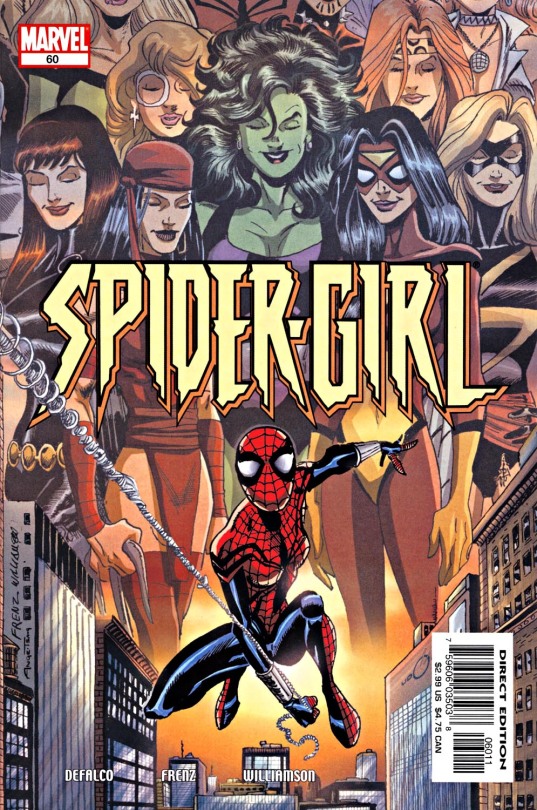
... And THEN she went another 40 straight issue for good measure before finally being continued in a relaunch.
So, given how the anniversaries of both her debut and the debut of her series/the MC2 universe have come and gone I have to ask...why has there been 0 acknowledgement from Marvel?
We’re in the middle of a 2099 celebration, and that imprint (that lasted less time and was arguably less successful) was an on and off presence between 2013-2017.

We’re going to get something acknowledging Iron Man 2020 a character who is hardly in the zeitgeist of Marvel fandom to the same extent as Spider-Girl.
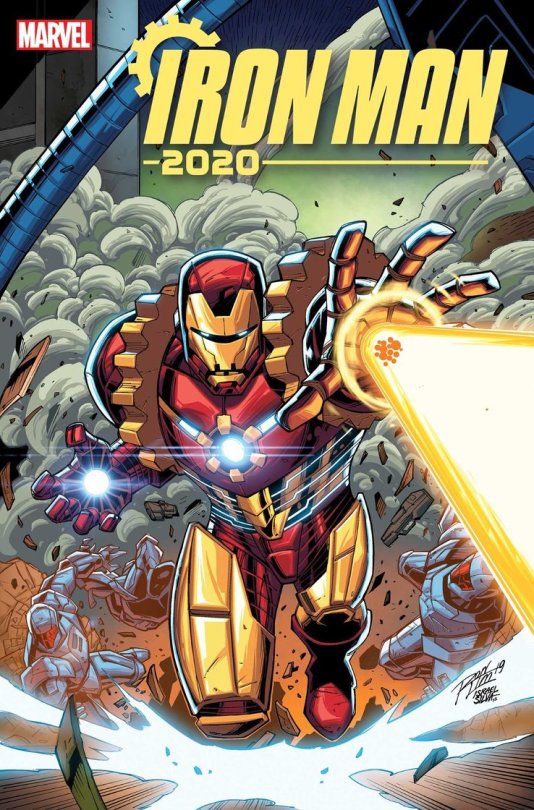
Now in fairness both of those examples are reliant upon the literal names of both properties. It does make a certain amount of sense to celebrate the 2099 line in a year ending in the number 9, thus bringing us ever closer to the real life year 2099. Equally it makes sense to revive Iron Man 2020 during well...the year 2020.
But then you get to Marvel celebrating the Earth X stuff. Now for all you out there who haven’t read the Earth X stuff I want you to ask yourself a question and be very honest with yourselves. How much do you actually know about the Earth X universe just via osmosis, without having read it. I’m willing to bet it ain’t much if anything and what you do know probably amounts to:
It was Marvel’s answer to Kingdom Come
Alex Ross did art for it
MAYBE you know Norman Osborn was the President
Oh and you probably remember that really cool Venom/symbiote looking character who was a version of Spider-Girl!
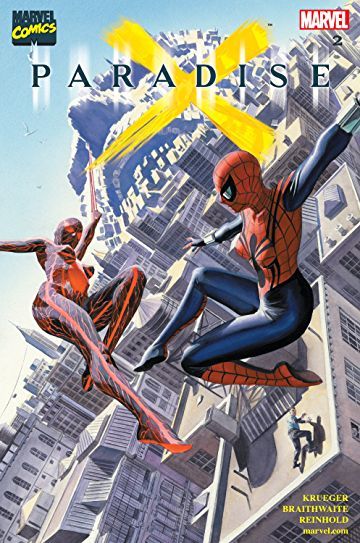
Golly, it’s almost like if Marvel are going to celebrate the not-that-well-remembered Earth X line (which like 2099 also lasted for less time than the MC2 universe) then they should do SOMETHING (beyond releasing some trades) to mark EITHER of the appropriate anniversaries for Spider-Girl and/or the MC2 universe as a whole.
But no. We get some trades and also Mayday appeared in Spider-Geddon for a few issues...at no point being solely in the spotlight...
This my friends is simply the latest in a very, very, very, very, very long list of instances where Mayday/the MC2 brand is mistreated.
And a lot of that mistreatment I think is due to Tom DeFalco’s hand in creating Mayday and the MC2 universe. Because frankly, in particular relation to the MC2 universe, DeFalco’s work has also been mistreated in recent years.
The facts are:
Mayday’s ongoing (Spectacular Spider-Girl volume 2) was turned into a mini in spite of solicits
She was cancelled so Anya Corazon could get the name Spider-Girl
The very next time she shows up her Dad is killed off, thus fundamentally wrecking the whole premise for her character
The guy who killed her Dad proceeded to treat her as an abused babysitter
That same guy finished things off by removing her unique name and costume
That same guy (Slott) in the same run before and after Spider-Verse wrecked other elements from DeFalco’s ASM work AND threw shade at his origin for MJ, calling it reductive
Slott also was hired by DeFalco and had to uncomfortably admit he’d conned the man. Which combined with everything else makes me wonder if DeFalco maybe threw some shade Slott’s way back when he was an intern. Like he looked upon him as underhanded and unworthy of his place in the company, and Slott knew that and resented DeFalco for it. And again, being EIC earns enemies and DeFalco was the EIC when Slott started
Slott also wrecked Ben Reilly a character DeFalco did not create but had strong associations with.
During secret wars the story focused HEAVILY upon Hope Pym, Stinger and Ant-Man at a time when coincidentally the Ant-Man movie was happening.
During Secret Wars the same writer who wrecked her in Spider-Verse COINCIDENTALLY happened to a story about the daughter of Spider-Man who was born during the 1990s, but it was his own OC
During Secret Wars, Mayday appeared on the cover of one of the ongoings she was set to appear in, but it was then revised to be Anya
Mayday when she began appearing regularly in a new title was seemingly killed off early into it and didn’t appear for awhile, not getting much spotlight when she did
Mayday had to share her spotlight moments in Spider-Geddon with Anya (again), still wasn’t allowed to be called Spider-Girl again, and the story was mostly about Annie not her.
She was going to appear in the USM cartoon but then that was totally changed to be a gender flipped Peter Parker
Eric Masterson/Thunderstrike, another well remembered DeFalco creation, has also gotten little-no attention this decade despite it being a 20th/25th anniversary of him too. One of the more notable acknowledgments of his character was turning him into a Neo-Nazi for Spider-Punk to beat up.
Spider-Girl’s VERY SUCCESSFUL digests were discontinued but conveniently other digests for other Marvel properties either continued or started up after Mayday’s were discontinued.
The ‘complete’ Spider-Ham trade paperbacks ‘conveniently’ do not include Spider-Ham’s equivalent character for Spider-Girl, Swiney-Girl
Gee that’s an AWFUL lot of coincidence, especially when you consider fucking Spider-Ham has been getting more attention from Marvel than Mayday; and that was BEFORE Into the Spider-Verse came out.
I’m sorry, but it’s really, really, really, really, really, really obvious that there is an anti DeFalco/Spider-Girl/MC2 sentiment within Marvel.
But why you may ask?
There are a few reasons for that. The biggest one though is that Tom DeFalco is the former EIC of Marvel comics.
At the time of me writing this, Axel Alonso recently stopped being EIC of Marvel and no bad words are muttered about him. People in the industry equally have little bad to say about Joe Quesada, especially those within Marvel.
But then again...Joey Q is still working for Marvel and in a position ABOVE the EIC. He never stopped working for Marvel even when he stopped being the EIC. And Alonso, one of Quesada’s right hand yes men conveniently took over for him and do you know he didn’t run the company all THAT differently to his former boss. Funny that right?
It’s almost as funny as how other former EICs of Marvel absolutely don’t have the same treatment. Jim Shooter is routinely BLASTED by countless fans and creators, especially the ones who worked under him, even though he oversaw arguably the height of Marvel comics’ creative history. Bob Harrass and his decisions are often talked about less than flatteringly. Tom DeFalco meanwhile had a whole disparaging phrase named after him.
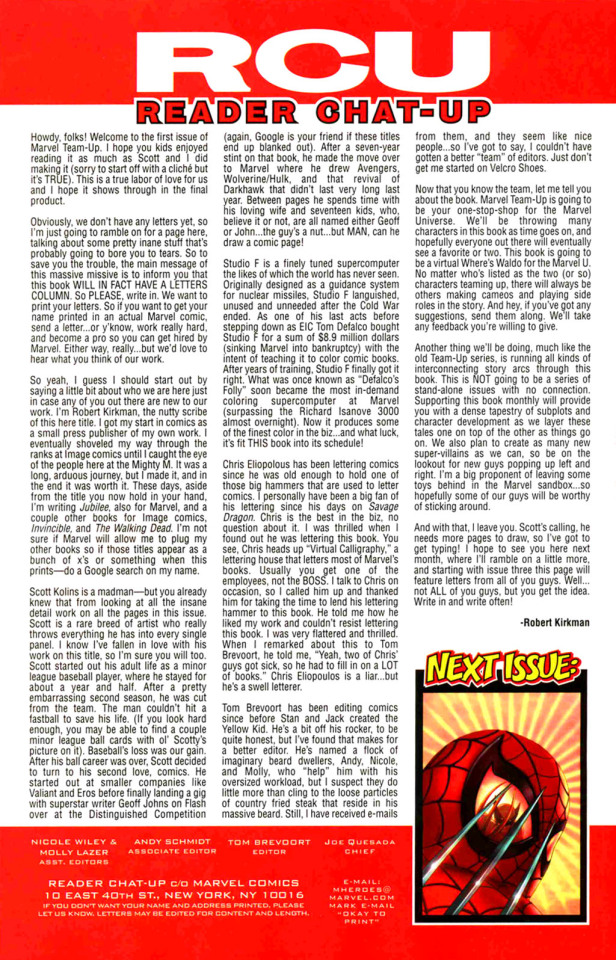
Yes. That is is a real life Marvel letter page from the mid-2000s literally using the term ‘DeFalco’s Folly’ in reference to a former Marvel EIC and outright BLAMING HIM for their bankruptcy in the 1990s.*
When you are the EIC you make enemies. It’s rare that the boss of any business isn’t resented on some level by their employees. And your words take on much more meaning that what you simply say, being subject to misinterpretation.**
But now imagine you are the boss of a bunch of creative nerds (for most creators of superheros are nerds). Creative people A LOT of the time tend to be fairly sensitive as is, it’s likely critical to their craft. Nerds historically have tended to be sensitive (that’s neither a good nor bad thing). If you are the boss of those people, hoo boy will you ever make enemies. Tom DeFalco in fact once told a fellow editor that an innocuous comment about how an artist under said editor’s employ drew a character was being taken by the artist as an insult to their whole career.
NOW imagine all that and also under your tenure the company goes bankrupt and a lot of people lose their jobs?
Enemies. Enemies galore.
Even if it wasn’t necessarily your fault, you are the most visible person in authority so you get the blame. If the internet wasn’t that much of a thing do you really think that Ike Perlmutter would be the guy who got the blame for deep sixing the X-Men and F4 in the 2010s? Hell no, it’d have been Axel Alonso and/or Tom Brevoort.
So yeah, Mayday was DeFalco’s baby and the MC2 universe more than anything was the logical extrapolation from the Marvel universe as it existed under HIS tenure as EIC. It’s very much seen as representative of DeFalco himself. Thus if people have an issue with DeFalco, they’re not going to do all that much positive as far as his stuff is concerned, in particular if it gives him anything like royalties.
But on top of all of that I think Spider-Girl and the MC2 universe simply conceptually lean against Marvel’s ‘party line.
I didn’t notice this, but it was pointed out to me by an acquaintance that the MC2 universe is VERY similar to DC’s Earth 2 concept, wherein the classic heroes are older and/or retired with their immediate descendants picking up their mantles. Marvel and DC have this petty and asinine pissing contest between them, with many within Marvel even outright hating the fact that they have numbered universes like DC. It’s likely (definitely) the reason Earth 616 was rebranded as ‘Earth Prime’. This of course won’t stop them ripping off DC if they think it’ll make bank
The MC2 universe was a universe of OPTIMISM. In particular in the 2000s, and this attitude has definitely lingered, there is this emphasis upon cynicism and at best Pyrrhic victories within Marvel. Partially this is due to a misinterpretation of what ‘realism’ means, but partially this is due to misguided belief that controversy sells and pissing the fans off makes bank.
The MC2 universe is very old school. It’s deliberately designed to be nostalgic and feel Silver Age in it’s sensibilities. this is why the violence is not all that gory, the sexual references are at best reserved and tasteful and there’s that optimism I talked about. not to mention it kicks back hard against the decompression/writing for the trade storytelling model Marvel typically employs and has typically employed for almost 20 years now. Whether it’s simply because the universe doesn’t conform, or because Marvel views anything ‘retro’ as bad because it isn’t ‘modern’ (with no inspection of whether the modern trends are a GOOD thing) the end result is that the MC2′s sensibilities are not in line with how Marvel WANTS their comics produced.
Then you have Mayday herself. Mayday is a living symbol of both the Clone Saga and the Spider Marriage. Whilst Marvel are NOW willing to more openly reference the Clone Saga, few people i any kind of positions of power look upon it (or even aspects of it) with anything but disdain and embarrassment. Dan Slott for instance openly hated it. As for the Spider Marriage...I mean do I even need to explain that one?
I’m sure a frustrating fact for Marvel during Spider-Girl’s publication, and something likely passed down to Axel Alonso when he was handpicked by Quesada, was that the book refused to die. Spider-Girl was scheduled for cancellation multiple times and defied the odds multiple times. Marvel 90% of the time won’t kill a book if it’s making a profit (especially in a day and age when they were still feeling the fallout from bankruptcy) so they kept Spider-Girl around, but because it was so against the party line I’m VERY sure they’d have LIKED to have had the justification for killing the title. That’s likely why they shuffled her onto a digital platform in 2009. Amazing Spider-Girl did poorly enough to justify cancelling it but not so poorly that they couldn’t still make money from it. Another relaunch would’ve boosted sales for the series, but making it a digital series at a time when hardly anyone read digitially (let alone PAID for it), now that’s a shrewd manoeuvre. You make SOME money from it, you pay lip service to keeping it alive and appeasing very upset Spider-Marriage fans, but you’ve essentially guaranteed it’s failure long term.
Part of that annoying success was those incredibly successful digests that were possibly indoctrinating a lot of young impressionable readers on a character/brand Marvel wanted to bury and aspects of their flagship character (read: a married older Peter Parker) that they wanted to bury. Hence Spider-Girl digests disappeared but conveniently there were still digests for Ultimate Spider-Man sold featuring a young, buffoonish, Avengers worshipping Peter Parker.
Oh...and she also had the incredibly brand sexy name ‘Spider-Girl’ that Joe Quesada wanted for his own precious pet OC character, Anya Corazon. In fact Mayday was going to be rebranded as Spider Woman in Spider-Girl #75, specifically so that Anya Corazon could be given the name Spider-Girl. Years later Mayday was cancelled specifically for that purpose.
tl:dr There is a VERY OBVIOUS anti Tom DeFalco/Spider-Girl/MC2 agenda within Marvel.
My hope is that it’s rooted out, hopefully as a result of the 20 year nostalgia factor kicking in sooner of later (her series was most prevalent in the 2000s) and more female creators coming into the industry.
*Which is very much unfair. There is rarely one singular decision that results in bankruptcy. So whilst DeFalco making a single purchase might’ve been a contribution (emphasis on ‘might’) the idea that it was THE ultimate cause of Marvel’s problems is ridiculous.
Marvel were heading for the shitter the moment Ron Perleman purchased it in the 1980s. They were the victims of a ‘pump and dump’ scheme wherein sleazy yet clever financial people showed up, created a bubble to make a load of money, then moved on to the next thing when the bubble burst. To my understanding a similar thing occurred with baseball cards.
** In fact DeFalco’s friend, Ron Frenz, has spoken about how he was witness to DeFalco saying one thing and the people listening to him hearing and acting upon it in a totally different way than was intended.
The same happened to Stan Lee when he made an aside about Iron Man’s lack of a nose, which resulted in his employees believing Stan wanted them to give Iron Man a nose.
P.S. You know in the 1990s when all the 2099 books got cancelled sans Spider-Man 2099, they never got a second bite of the apple.
But between the late 90s and 2000s the MC2 universe was seemed successful enough that around 2006-2007 both Spider-Girl AND the wider MC2 universe were given second volumes, even the ones that only lasted like 6 issues.
Since then there’s been at least 3 attempts to revive the 2099 universe, we’re living through the latest one.
And yet Mayday doesn’t seem to even be worthy of a spotlight issue in the current Spider-Verse series.
#Spider-Man#Spider-Girl#Mayday Parker#mc2#mc2 universe#Tom DeFalco#Ron Frenz#Thunderstrike#Eric Masterson#Dan Slott#Joe Quesada
185 notes
·
View notes
Note
I think your take on Doublemeat Palace is interesting because to me it's emblematic of all the things that make Season 6 (particularly the back half after "Tabula Rasa") not work for me. It's relentlessly grim and unpleasant and I can feel the writers twisting the plot to make sure every character is as miserable as possible. I'm not opposed to seeing protagonists in a low point or even outright failing. Season 3 of Game of Thrones is some of my favorite TV ever. (1/2)
(2/2) But at a certain point the grim and gritty, if it's not well written, and broken up with some moments of lightness (like Buffy was previously known for) the audience gets numb. It also doesn't help that no one has any agency. (Magicrack, the not!wedding, Dawn doing zip) Again, I'm not opposed to dark plotlines. I'm opposed to incompetent writing.I don't think you can call an episode or an arc "objectively" good if it doesn't work for the majority of the audience it's been written for.
you know, i’m going to disagree about the “grim and gritty” thing. doublemeat palace actually stands out to me as being really funny. and for having a lowkey positive ending. true, the episode is about the soul-sucking prospect of having to do the same dreary work every day. it’s about how much it sometimes sucks to work, which is why you have willow dealing with the fact that recovery is a difficult thing that you have to decide to commit to every day, xander and anya facing the fact that marriage is also a lifelong daily commitment, and buffy taking an unpleasant and mechanical job in order to put food on the table (and the episode plays up that the managers have been doing it for five or ten years). but like, names like “manny the manager”? the weirdo robotic people? the exaggerated camera angles? the swirling cow and chicken? buffy’s constant attempts at jokes? “hot delicious human flesh”? a little old lady with penis monster on her head? this stuff is totally absurdist. i think of doublemeat palace as almost the opposite of episodes like once more with feeling and tabula rasa, where things superficially seem fun but are actually quite dark. doublemeat palace seems superficially unpleasant but actually has a wicked sense of humor. and i say that the ending is positive because it involves both willow and buffy committing to doing work. they’re faced with the opportunity to “cheat” at life like the trio, who steal money instead of having jobs, but ultimately decide to do the right thing. willow doesn’t accept amy’s magic and buffy doesn’t blackmail the company.
that goes for a lot of season six, in my opinion. even late season six. people say there was less humor, and i think that’s true to an extent, but honestly i think it’s more that the tone of the humor changed. it got more sardonic and absurd, but was definitely still there. eg people think of seeing red as the episode where the two Very Bad Things happened, but outside of those scenes a lot of the episode is like, fascinatingly (to me) slapstick (the whole jetpack bonanza? “say goodnight bitch” “goodnight, bitch”). and has that really lovely conversation between buffy and xander at the end. in general, i think a lot more season six episodes have positive endings than it gets a reputation for. i already mentioned the ending of doublemeat palace. but the end of gone has buffy saying she doesn’t want to die, the end of older and far away has buffy deciding to stay home with dawn, the end of as you were has buffy deciding to break up with spike, and the end of grave has buffy, willow, and spike all making important changes for the better. as in, season six can be very dark, yes. but i would not call it a hopeless or cynical kind of dark. it’s about the characters clawing their way out of that dark place. not just a statement that “adulthood sucks.” you can argue that the season didn’t pull off its attempts at lightness, but i very much think they’re there.
at any rate, i agree to an extent that if a work of art isn’t working on most people, that’s probably a sign it’s doing something wrong. but i’d offer the counterpoint that you might also say that if a work of art really works on some people, even if not everyone, it’s probably doing something right. as far as the season as a whole goes, i’d actually take issue, on a basic factual level, with the claim that it didn’t work on the majority of people. not to validate IMDB’s ratings for buffy’s episodes, but it does have an n=~2000 sample size and if you average out the ratings by season, season six doesn’t rank starkly lower than any other season. it’s on the less popular side, but it still hovers around an 8.0 average like most of the other seasons. moreover if you go by the big r/buffy polls (n=~120-310), season six ranks in the top three favorite seasons every year they did one (2011: 3 > 6 > 2, 2012: 6 = 3 > 5, 2013: 6 > 3 > 5, 2014: 3 > 6 > 5, 2017: 5 > 3 > 6). you can see the data for yourself if you scroll down to where it says “surveys”. perfectly possible that there’s data that paints a totally different picture. this is just what i had on hand. that ranking also doesn’t mean the majority of people liked the season, but it does act as evidence that there are a lot of people whom it really worked on. basically, i wouldn’t say that season six is disliked so much as it’s divisive. people seem to either love it or hate it. with a smaller percentage that likes it, but for whom it isn’t a favorite. or who appreciate what it was trying to do but don’t think that it succeeded.
as far as doublemeat palace goes i notice a similar phenomenon. people either really hate it or they really relate to it. either they think the style is bizarre and annoying or they think it’s delightfully surreal. so it really seems like it’s up to the individual whether they want to lend more credence to one audience reaction or another in order to assess quality.
which is why i tend to use my own rubric. when i ask myself whether something is good or bad, i pay a lot of attention to (1) is the work trying to do or say something specific? (2) how unusual or challenging or astute is the thing the work is saying? (3) how coherently is it doing that, and on how many different levels? (4) on a formal level—dialogue, cinematography, costuming, acting, pacing—how fluently was it executed, and how well did the formal choices contribute to the ideas in (1)?
for the record, i don’t think that doublemeat palace is the best episode ever. i just think it’s solid, and fits nicely into what i think the season as a whole was doing. but the reason i say that it’s “objectively” solid according to my personal rubric—which granted, you’re more than welcome to not share—is that (1) it has a pretty clear idea that it’s exploring. the drudgery of work stuff that i mentioned in the first paragraph. moreover i think that idea is really relevant to the season-long topic of “what makes it feel like adulthood sucks”. buffy having to take a menial food job fits into the season’s food motif that i talked about once, which in turn fits character-wise with buffy’s ambivalence about being alive. a somewhat grotesque/humiliating job fits with the mood of material existence being unpleasant. (also, xander impulsively chowing down on food speaks to him probably not being ready for commitment) (2) i think this whole subject was just hella daring for the show to do. having been a poor and suicidally depressed 22 year old in a fucked up sexual relationship while working a menial job, season six and episodes like doublemeat palace just ring true to me as something for a show about growing up to depict. sometimes real life really is a grind, and sometimes it really does feel profane, absurd, surreal, etc. (3) i really like the way that buffy, willow, and xander and anya’s stories all fit the theme of episode but in different ways. i wouldn’t say the episode is a super nuanced take on drudgery, but it does have layers thanks to the three different storylines, and it comes off as clearly conscious and oriented around its theme. there are other parallels like amy, spike, and halfrek each being influences, too. (4) there’s some cool formal execution. not all of it. willow’s story, like a lot of her mid-season-six arc, is kind of tediously on-the-nose. but i enjoy pretty much every second of buffy’s part of the episode, because the direction is so in control of it. and i like the absurdist and genre-conscious playfulness. the soylent green riff, etc.
i also disagree on your assessment of agency in the season but this post is long enough as it is. regardless, i certainly don’t begrudge you your opinion. it’s an often clumsy season. it also sounds like we enjoy things in different ways--i genuinely don’t care too much about writers contorting things in the interest of theme. i’m mainly trying to push against the implications (1) that the season was obviously just trying to be dark and grim, and just for it’s own sake or something. instead of for deliberate and interconnected artistic reasons that one could analyze and talk about, and (2) that there is some monolithic opinion on and response to it.
#s6#sigh i tried to add a tag and the read more got messed up#man tumblr code is fucked#fyi people are welcome to respond to this but i probably don't have more bandwidth to respond back#also if it wasn't clear from like 70% of this blog i adore season six and it means a lot to me#so at a certain point 'why season six is bad' discourse just kind of makes me sad#even if i respect why people think that and agree with various criticisms
16 notes
·
View notes
Text
Randy’s Ultimate Birds of Prey Review (first thoughts)
I want to preface this by waxing just a little poetic here, because I can. The true spirit of the Birds of Prey has been and will always be in the way women love and support one another. As friends, as teammates, as sisters-in-arms against whatever the world throws at them. And while not every comic, not every story, will be Completely Outstanding or without fault, I can say with certainty that when given to competent writers and loving artists, to diligent crews and hard-working casts, that that spirit is seen and felt just as strongly.
First we’ll be tackling the comics, separating them mostly by run (with Dixon to start, the Simone’s turn at the line to follow, then 2010, New52, and BatBoP). Then we’ll discuss the two separate forays into live-action that the Birds have taken (BoP02, and BoP20 respectively) And to finish it all off, we’ll take a prospective look at HQatBoP, given that (at the time of this posting) it has only one issue, and more than enough untapped potential. To keep myself focused and keep things hopefully brief, we’ll be discussing each run’s Line-Up, Writing and Art, and finally overall Plot/Character Development. I will also try to keep things as spoiler-free as possible, but it’s also been a decade since some of this stuff was written, so... YKNOW Spoiler Caution Advised.
Without Further Ado, Let’s Fly~
The Dixon Era:
The Line-Up
As the Definitive Starting Point for the team, this era is marked most notably by the sole members, Dinah and Babs, and their numerous memorable one-off adventures. They are joined on a few occasions by other heroes. Or, while working separately from one another, will team-up with others as they lead their individual lives. The core of this budding ‘team’ remains as a duo for the majority of this part of the run, however.
The Talent
Dixon and his writing is not without faults, of course, as any given international mission could fall prey to stereotypical archetypes and pitfalls. For the most part, Dixon’s writing remains among some of the most entertaining I’ve found, comparatively speaking. With a knack for wisecracks and poignant thoughts alike, I find myself looking forward to more of his work, with a great sense of cautious optimism.
The art, in this same vein, can be also be hit or miss at times, just as much as exploitative panels/questionable dialogue make their inevitable way in. I cannot recall anything outright offensive or demeaning, but one should approach with measured expectations.
The Development
Easy to follow along, but with plenty of twists and turns to keep me interested in the direction any given mystery would lead our duo. The banter and camaraderie that’s slowly and surely built up between Dinah and Babs had me falling ever more in love with their dynamic and with their bond as they grew to not only work well with one another, but into becoming fast friends. The focus is in the development of these characters and this new season of life they find themselves in, rather than grand-sweeping, or long-running plots. But with fun enough jaunts and adventures regardless, I already find myself looking forward to rereading these issues in the near-future.
It is important to note, that in the interim between these two general eras i have marked, that there are numerous Other Writers that took their own cracks during this particular run of BoP, both preceding and superseding Simone. As she and Dixon have the longer-running pens, and that they have the most notable influence in the fandom consciousness, is the biggest reason for why i’ve named these sections as such.
Simone’s Turn:
The Line-Up
A Turning Point for not only the run itself, but the group dynamics as well! This era is marked by the permanent reintroduction of Huntress onto the team, Lady Blackhawk being another quick to follow, and the team’s subsequent rotating cast expanding to many heroines beyond as well. Simone’s writing doesn’t miss a beat in the banter, however, and takes the team from Dixon just as steadily as runners pass a baton.
The Talent
Again, the writing itself usually never misses a beat, and the art, as memory serves, carried very well alongside it, something most usually without offense and downright enjoyable in some places to pour over. While there were certainly some moments and dialogue that gave me pause, for the greater majority of this run, one can expect entertainment, nonetheless.
The Development
While the preceding run had focused moreso on interesting stories and one-off adventures, here is where longer-running plot threads began to take root, and more complicated games and chases between heroes and villains were given room to unfold. Most notably as the Calculator takes more and evermore dramatic actions against Oracle and her team. Not without its fair share of delightful rough patches as team dynamics shift right alongside the cast rotations, anyone who appreciates a long game and character development is likely to come away satisfied from this run, even as it draws to brief close... Which brings me to...
BoP (2010):
The Line-Up
Picking up not too long where the previous run ended, Oracle brings her team (Black Canary, Huntress and Lady Blackhawk) back together with a couple new faces (Hawk and Dove) to wrap up a few loose threads, and, hopefully, begin something anew.
The Talent
As before, Simone doesn’t usually miss a beat with this team, even while taking account the changed dynamics and time apart the group has spent. Dialogue and plot threading is just as tight as ever.
Unfortunate, however, is the fact that the art in the run ended up with more misses than hits for me, mostly in the first half of the run and most often in the sense of objectifying and oversexualizing our heroines in fashion that is disappointing, but unsurprising coming from the comics industry.
The Development
The plot takes a bit of a beating, rushed in some places as Flashpoint and the New 52 reboot loom heavily on the horizon, but Simone and the team superseding her take those changes in stride, delivering a story that may or may not satisfy everyone’s tastes. For those who were left wanting from the way the first run ended, it’s important to note that the threat of the Bird’s longer running nemesis, the Calculator, comes to a much more satisfying and final end after his temporary defeat in the Oracle: The Cure miniseries. While not entirely necessary, I would highly suggest reading that mini, and the issues of Batgirl (2009) which include Babs, to get a clearer sense of the arc that Barbara and this villain have taken. While this run is not a perfect ending, per se, it provides an ending nonetheless, and an entertaining adventure to cap off the series that once again perfectly encapsulates what camaraderie and sisterhood is all about for this team.
The New 52:
The Line-Up
With a fresh new universe and timeline to make one’s mark in, this team is kick-started alone by Dinah Drake-Lance, though Barbara (as Batgirl) is later to follow. For the first part of the run, Dinah is joined by a new character Starling, (whose mannerism and role on the team most closely resemble of fusion of previous members Huntress and Blackhawk) Katana, and Poison Ivy (acting a role of anti-villain, mostly). For the latter half of the run, following Ivy’s betrayal and Katana’s desire to strike out on her own, the team is joined by Condor (a meta whose backstory and powers are explored as the series progresses) and Strix (a former Talon who brings extra and endearing muscle to the team).
With many members carrying secrets or ulterior motives, tension often runs high among these birds. Those who enjoy drama or a little more disarray in a team, may find themelves entertained by the turns these ladies will take on one another. Most certainly a break from the norm previously established, and from those to come.
The Talent
The writing for this run is filled with many quick quips and snaps, each character developing a distinct voice and personality. While the New 52 is often a point of contention among DC fans, anyone wishing for something fresh or different from pre52 characterization of these characters may find themselves delightfully surprised.
Art-wise expect similar fare as the 2010 run, as some costume design choices are questionable at best. The action itself is entertaining, though, with some interesting opportunity for unique visuals as more metahumans and meta dangers are brought along.
The Development
What sets this run apart from the others, certainly has to do in the dynamics that are laid out over the series. Every character has their own motives or secrets to hide, creating a delicious tension that helps keep a reader guessing just how this team will inevitably break apart. Story arcs themselves are usually pretty well-paced, though with such heavy focus usually on whatever threat immediately faces the team, moments of character development and interpersonal development can be lackluster at best, nonexistent at worst. And while that was certainly frustrating, I personally found myself intrigued enough by any given on-going plot to nearly forgive it... Nearly.
BatBoP:
The Line-Up
In the Wake of Rebirth, the Birds find themselves once again starting anew, with Batgirl (Babs) and Canary (Dinah) forming what each believes to be a brief alliance. With the Huntress crossing their path, eventually the trio recognizes how well they work together, and these three remain once more as the core members for the majority of this run.
They are joined for a brief time by Gus Yale, taking on the Oracle identity to provide technical back-up. Even more brief is a memorable team-up which included Gotham heroine and villainess alike for the Manslaughter story arc.
The Talent
While exposition is often written with a flair of humor, and many interesting one-liners can be found, overall that humor can grow tedious, and the dialogue itself often came across as either very stilted or simply unrealistic. Many characters can fall very flat, while others feel like shadows of their pre52 selves. Whether the writers intended to make these characters their own or to emulate previous characterizations, I could care less about, as the pacing and plotting itself leaves such a poor taste in my mouth.
This run’s saving grace, however, is most certainly in the character design and the artwork. Given practical costumes, colorful palettes, and powerful posing, visually it’s a breath of fresh air.
The Development
Quick and simple story-arcs is the name of the game here, but unlike during Dixon’s era, these one-off adventures are all too often infantilizing and condescending towards its audience. The development of this trio’s friendship also feels extremely rushed, the camaraderie and kinship unearned compared to the toil and work put in during previous runs. With a completed long-running story arc set from the beginning issues and brought to a neatly-wrapped conclusion by the end, one can walk away satisfied that a story has been brought to completion. However, with no true middle act in the issues between, this remains one of the weakest of Birds runs for me, as the plot borrows much too heavily from pre52 (what with the return of the Calculator as a main villain), while also neglecting to produce too many original ideas of real note.
BoP02:
The Line-Up
In usual fashion for TV, we mainly follow a trio of gals, this time consisting of Barbara Gordon (as Oracle), Helena Kyle (as the Huntress) and Dinah Lance. Rounding out the supporting cast is Alfred Pennyworth as a confidant to the team, and Detective Jesse Reese, Huntress’ ally within the police. The main antagonist for this series is none other than Harley Quinn, who is introduced first to the audience as Helena’s therapist.
The Talent
It takes a team to pull off any performance art, but that especially rings true for television. While the writing and acting can be a tad hammy in many places, even by early 00s standards, there’s a clear level of love and care taken by the actors and crew alike. Outfits and costuming is fairly typical, fashionable for the time, even, and the same can be said for the soundtrack as well (which rings with an air of nostalgia, as someone who listened to plenty of pop/rock tracks of this time period well throughout my child & teenagehood).
I’ve often described this series to friends and fans alike as a ‘so bad, but good’ kind of show. Which isn’t entirely fair. Rather, it’s a guilty pleasure, because it’s perfectly imperfect. It’s got the heart and the soul and a lot of vision that falls just a little short at times. But it can be a pleasure to view all the same. I do not begrudge anyone who chooses not to view it, however, as in many ways it feels like a spiritual predecessor to what would eventually become the CW/Arrowverse. And we’ll dive more into that just below...
The Development
In an odd enough twist for the time, as by 2002 Huntress (Bertinelli, that is) had only joined Canary on a few missions in the comics, the show runners have replaced Bertinelli with the other known Huntress, Helena Wayne (or known here, rather, as Helena Kyle). Made stranger still, is forgoing the use of Dinah’s character as Black Canary and replacing her Canary Cry with psychic meta-abilities instead, simultaneously transforming her into a runaway and aging her down to her mid-teens, further differentiating her from her fellow cast members (as Kyle is portrayed as early 20s, & Babs’ as early 30s). This dynamic is a very dramatic flip compared to the comics, but (but!) not entirely an unwelcome one, for me.
While giving Babs the chance to act more as a leader and den-mother alike to these two budding heroes. Kyle, in similar fashion, taking on an elder-sibling/mentor role to Dinah’s naiveté. Dina’s portrayal of Babs has certainly set a standard for those who may follow, as she captures so much of the dual love and sternness the character carries. Kyle’s character takes a simple, but satisfying arc as she learns to trust those around her, despite her past and what she believes to be her nature. And finally Dinah just starting to come into her powers and her identity, one could see further development for her character, had the series progressed beyond the first, and only season.
Alas, with one lone season, we shall never know what may have been. I can say, however, that the slow build up of Harley as the main threat facing New Gotham, and their swift, but hard-won defeat of her, was wonderfully satisfying. And with enough of one-off and self-contained episodes in between, it makes for an interesting, but quick and relatively painless binge.
BoP20:
The Line-Up
In another case of Adaptation Deviation, taking center stage for this story is none other than the Clown Princess of Crime, Harley Quinn. In this tale that our protagonist narrates, we’ve also got BoP staples Dinah and Helena (Bertinelli this time) returning, and former guest ‘Birds’ Renee and Cassandra to round out the protagonist team. The Black Mask, Roman Sionis, and serial killer, Victor Zsasz, serve as the primary villains.
The Talent
WHERE to even BEGIN. If television takes a team, movies take an entire goddamn VILLAGE to pull off, and to pull of WELL. For all intents and purposes, BoP(atFEoOHQ) is an absolutely goddamn DELIGHT for the senses. The sheer amount of COLOR, choreography and every moment acting as villains and heroes alike are at the TOP of their game. The soundtrack is something that I’ve been listening to for well over two months at this time of posting (& likely will continue to listen to well after). There’s almost too much to be said and has already been said about the love and labor that clearly went into this film, but suffice it to say, it’s something I’ve come to appreciate even more every time I’ve had the chance to rewatch it. On viewability alone, even with a strong, and well earned R-rating, one can’t help but simply sit back and enjoy it for the ride that it is.
The Development
The plot, despite even Harley’s sometimes roundabout storytelling skills, is simple enough to follow. And with character introductions and motivations padding out the rest of the runtime, and leading up to a predictable but nevertheless astounding 3rd act team-up, fans new and old should walk away satisfied. That being said, with Harley as our protagonist and her character arc taking precedent over the others because of that, this movie does come across as more of a Harley Quinn Show with a Side of Birds. Another point of contention is the absence of Barbara Gordon, either as Batgirl OR Oracle, and the drastic change of Cassandra’s characterization. While these two points are definite drawbacks that sadden me, the overall production is damn-well near enough to make me forget. This movie, while nowhere near a Complete adaptation of any particular Birds comic, is nonetheless a fun romp, and captures enough of the essence of what Birds should be about; women uplifting other women.
HQatBoP:
The Line-Up
To tie in with the movie, this line-up follows the same five female protagonists, this time as Harley finds danger following her as she makes a prodigal return to Gotham City. With only one issue out, and hints of the Gotham mob and Joker alike to be facing our team, only time will tell just how many heroes or villains may be involved in this miniseries.
The Talent
With Harley Quinn alums, Amanda Conner and Jimmy Palmiotti spearheading this story, and with the blessing of the DC Black label, fans who enjoy the raunchier or more violent side of comics, and who enjoyed the Harley series, will find a fantastic start in return to form in this comic. It might be a little too soon to tell, but from what I have read from this duo already, I have nothing but hight hopes for how they’ll flesh out this story.
The Development
An interesting start and lots of exposition to ease new readers into place, this comic seems to be a good bridge for those unfamiliar with any previous Harley work (though they do sample heavily from their old runs), or those who may be coming solely with knowledge from the movie. Once again, Harley will be taking the center stage in this series, but already with Helena and Cassandra joining her fight, and Renee making an antagonist entrance at the end of the first issue, this series feels full of promise. Certainly not quite like any Birds series that’s been published before, but hopefully the herald of something more to come.
---
While I firmly believe each comic run has their merits, I would be remiss not to recommend the original run (and the 2010 follow-up) above all else. It is the definitive run, after all, and with over 100 issues to pour over, plus one-offs and miniseries from the same era abounding, anyone looking to get into Birds will find themselves with plenty to parse through, and plenty to enjoy, when reading.
While I certainly have more to say about these runs and even more so about these characters, as I close out my reading for the first time on Birds of Prey, I can only hope for more adventures for this team in the future.
#randywrites#long post#(in case the cut doesnt work oof)#randy reads bop#randywritesmeta#birds of prey#bop02#bop20#bop52#batbop#won't tag each individual character involved bc I'm not Insane#but ill bump this later bc uhh wow its Late huh#also DEF have way more to say about bop02 and well the rest#but i really tried to cut myself short in some places but like#bop02 esp deviates in ways that the others just Don't so like#we Don't Have Time To Unpack All Of That but i want people Properly Warned before they Dive Into that show#bc its Not Perfect but it IS again. a Guilty Pleasure#theres just... SO much more to say... but we'll stop here for now oof#but i will NOT shut up abt this team ever now haha.#not if i can help it
20 notes
·
View notes